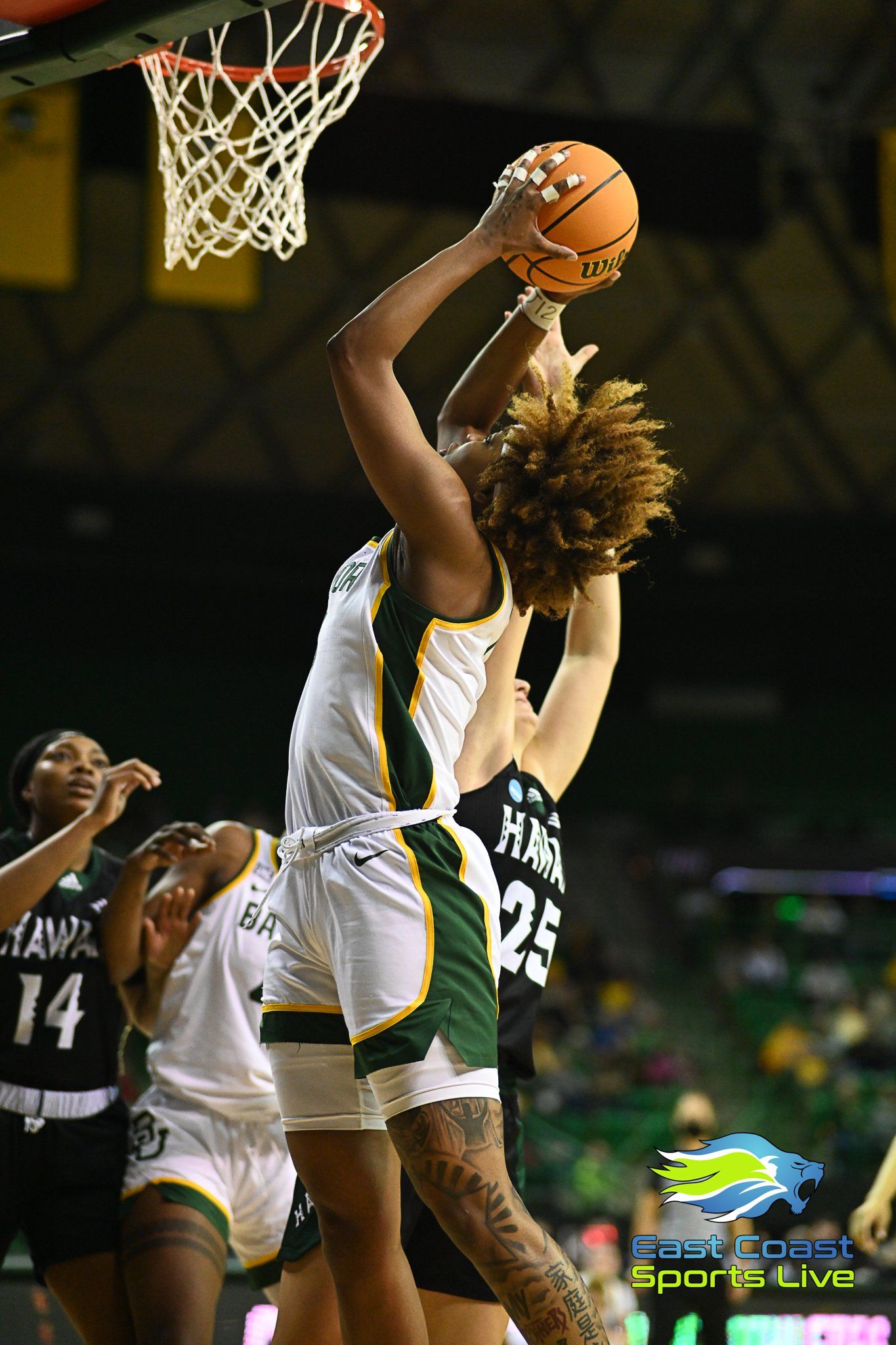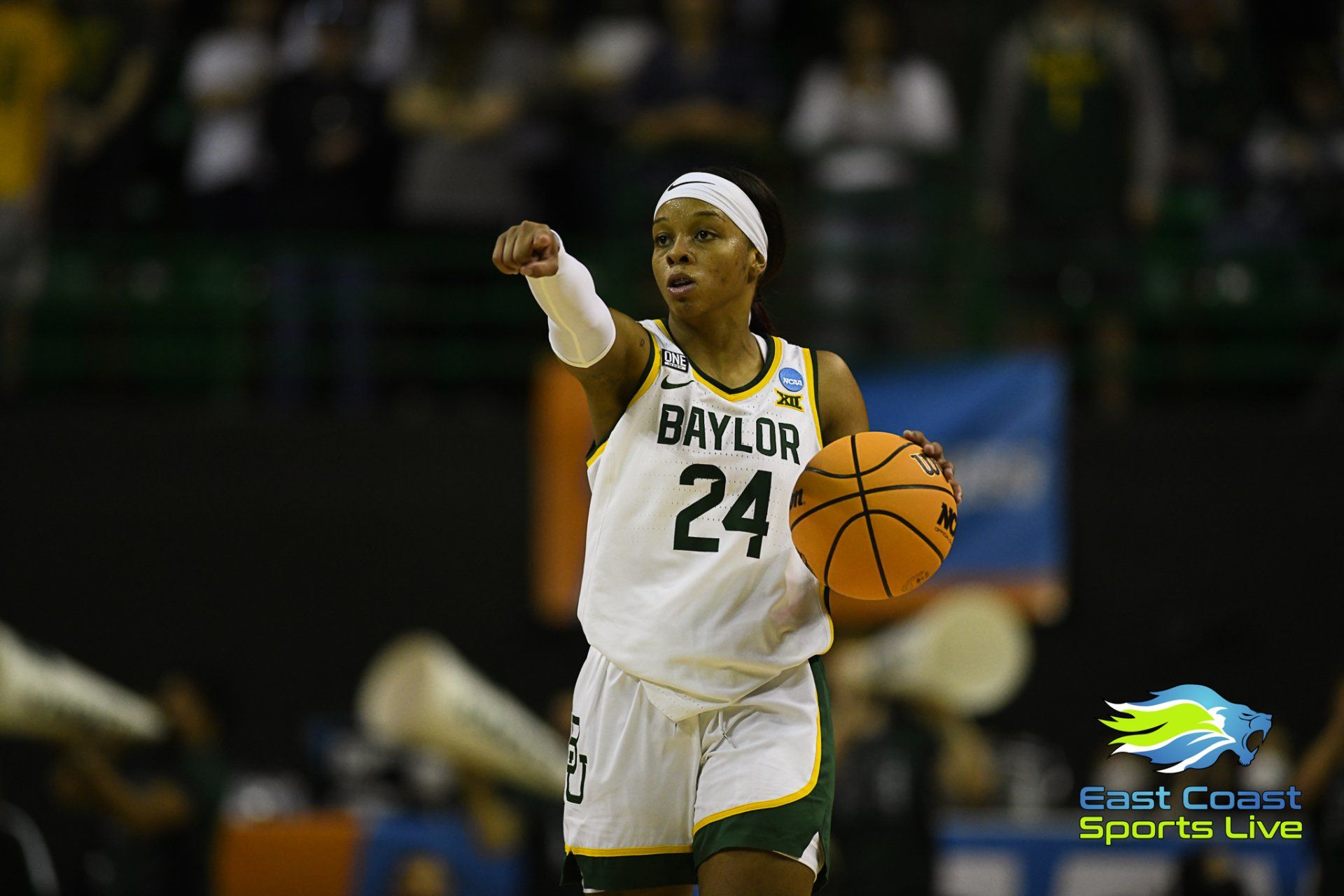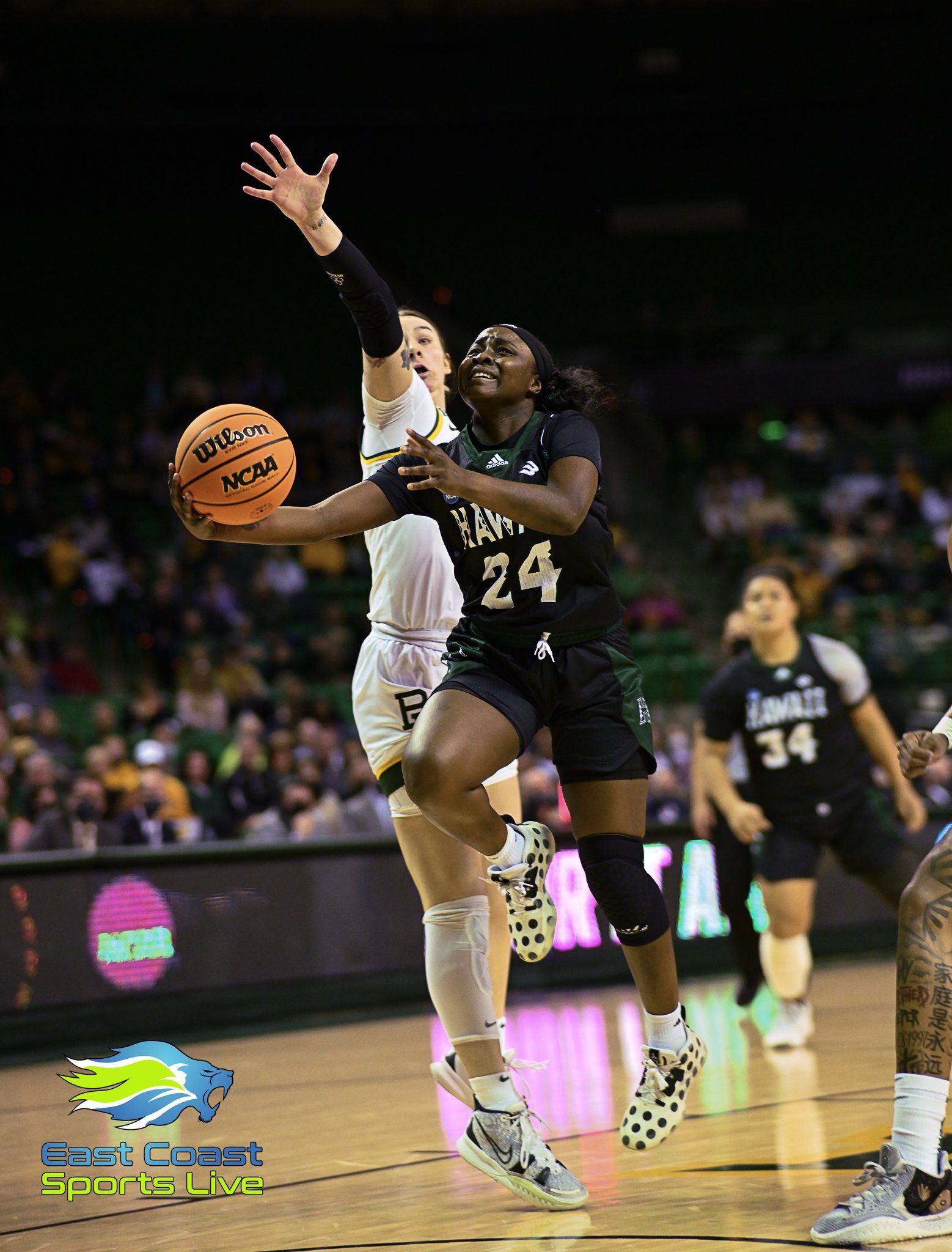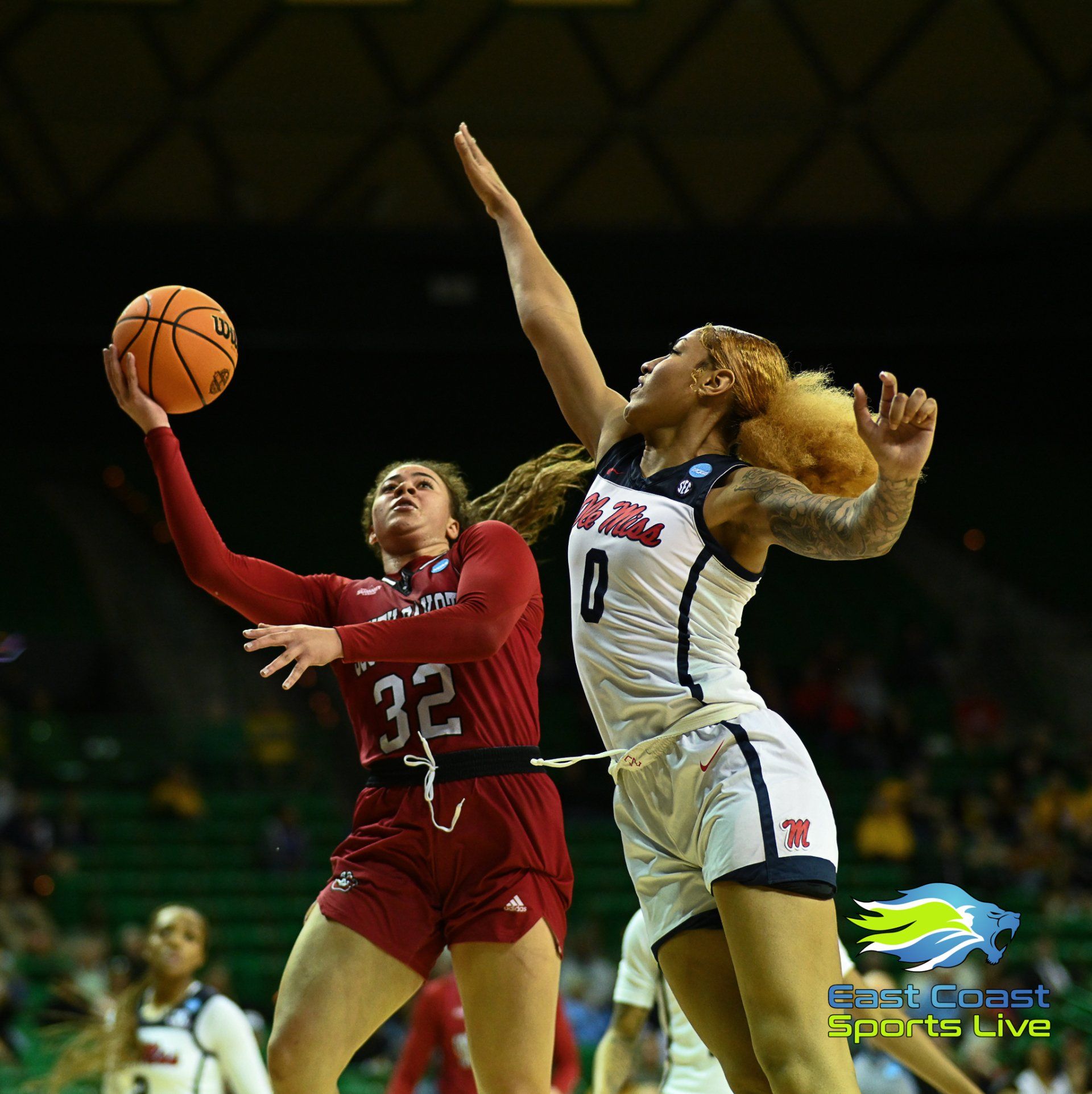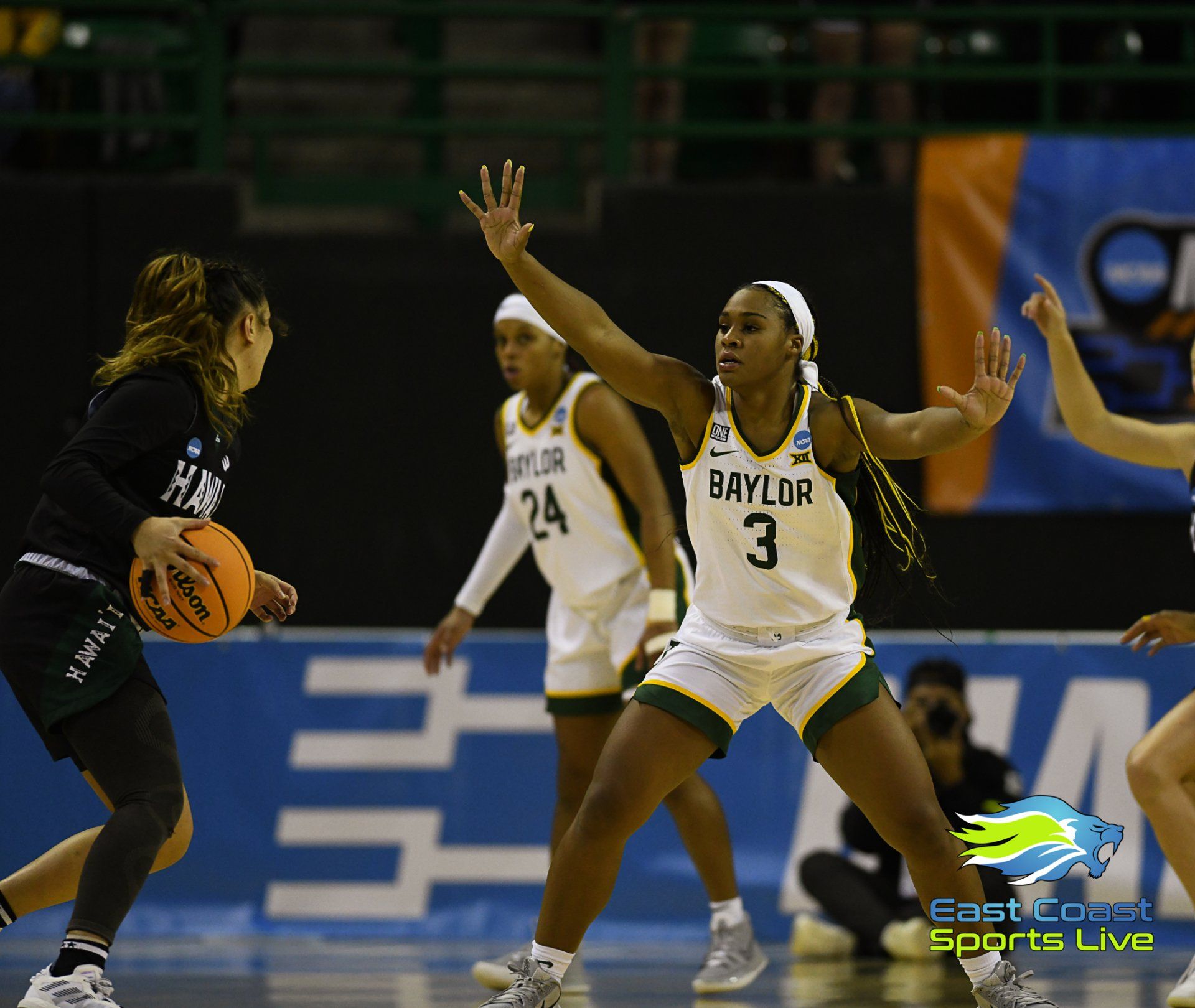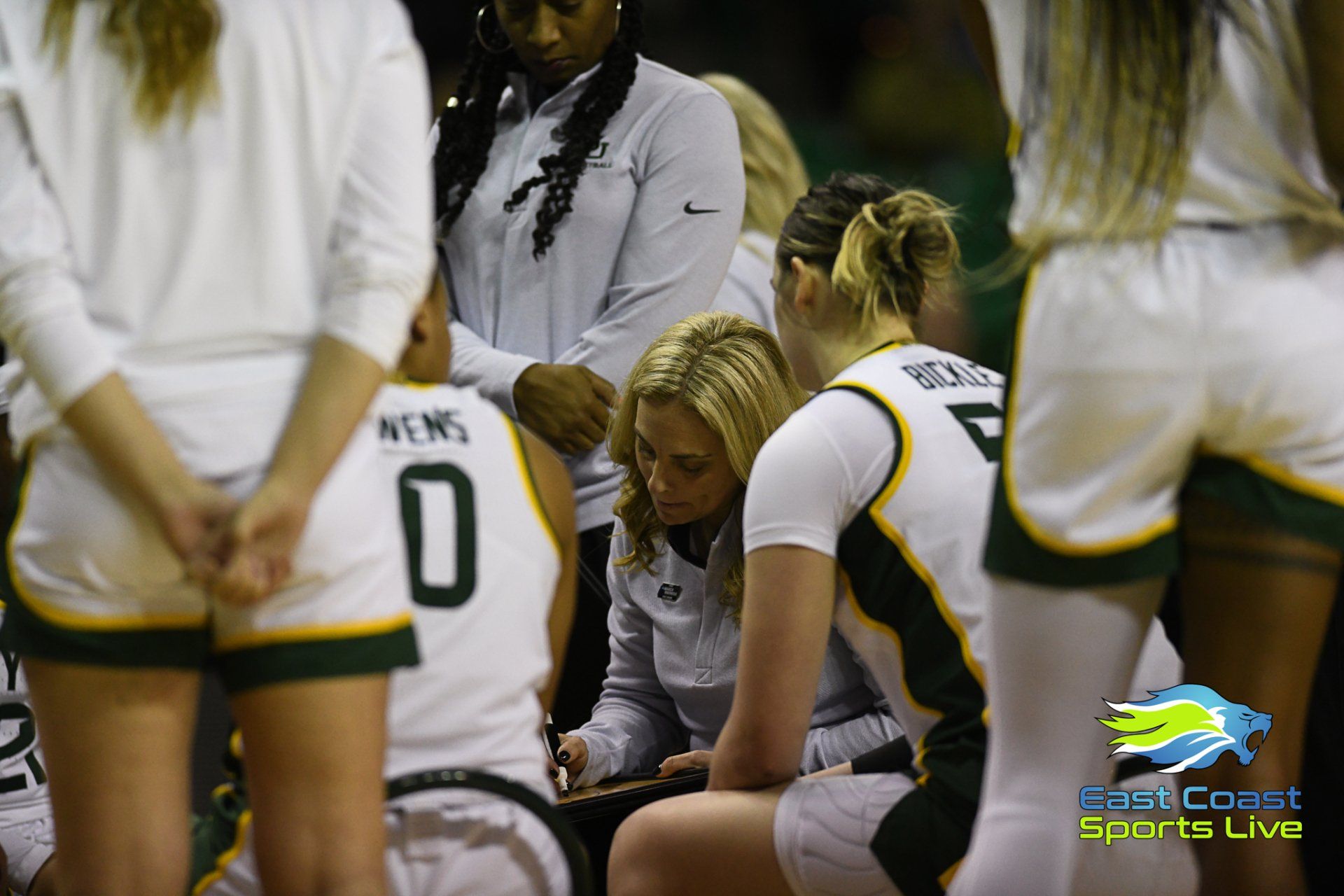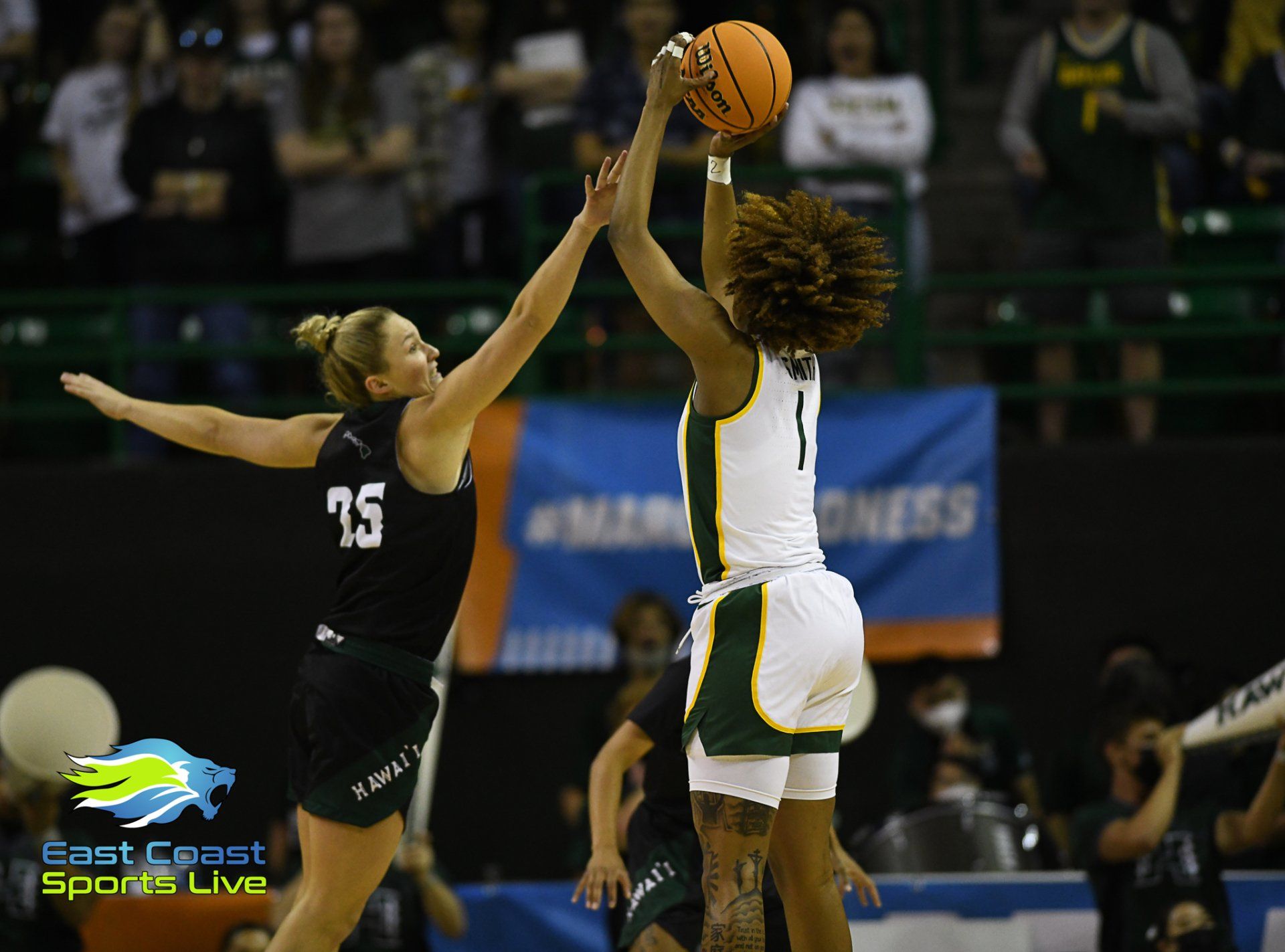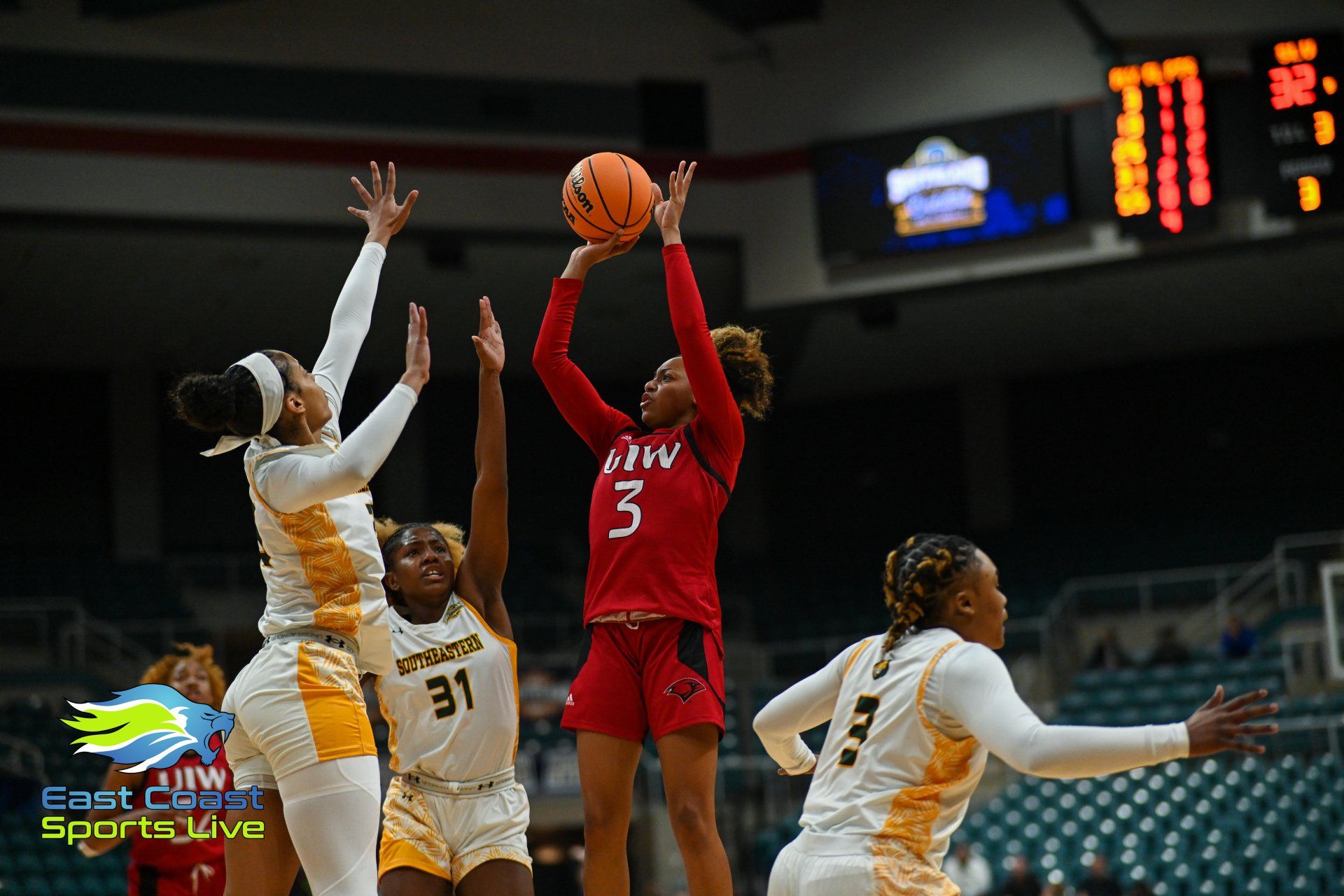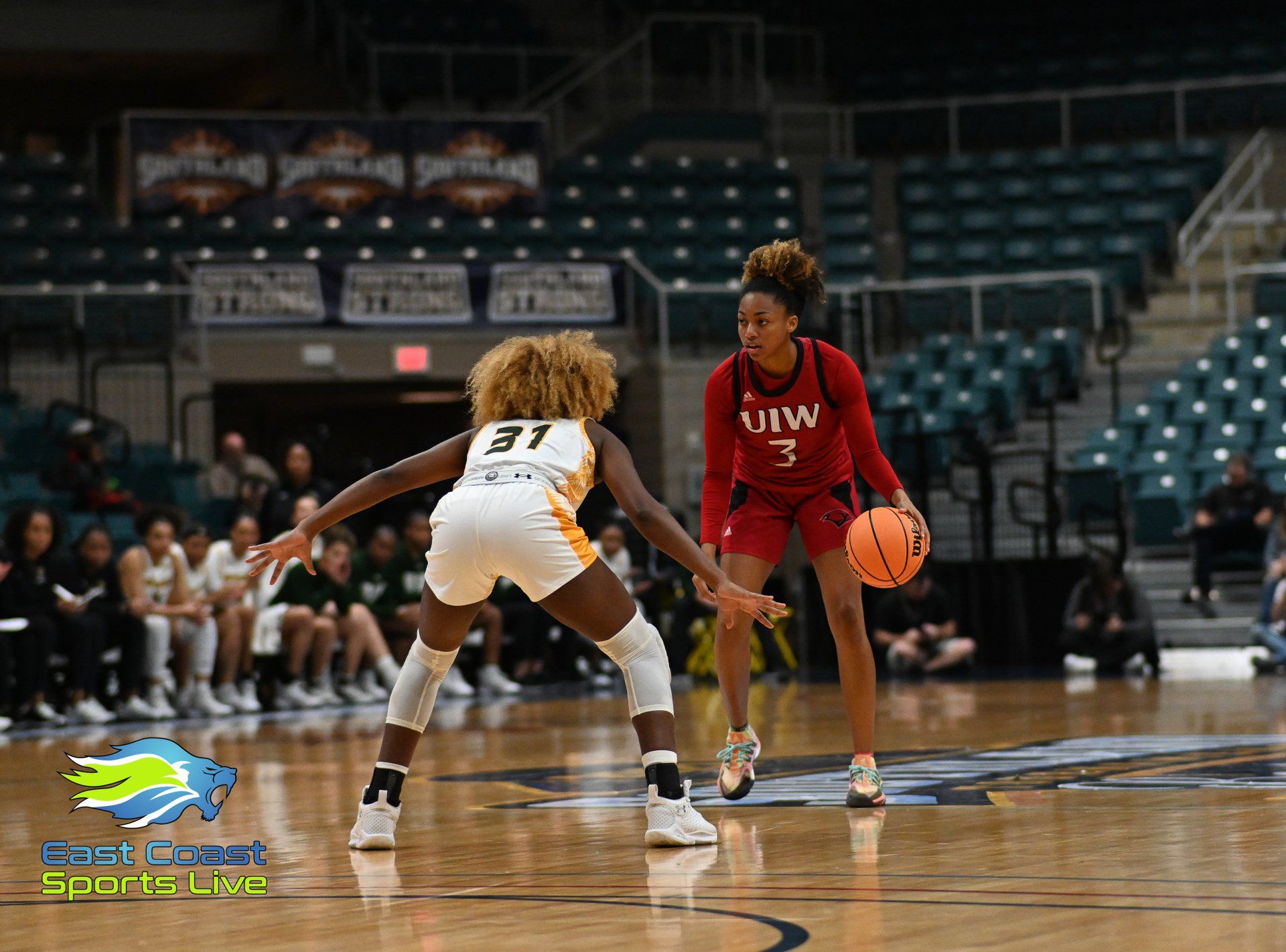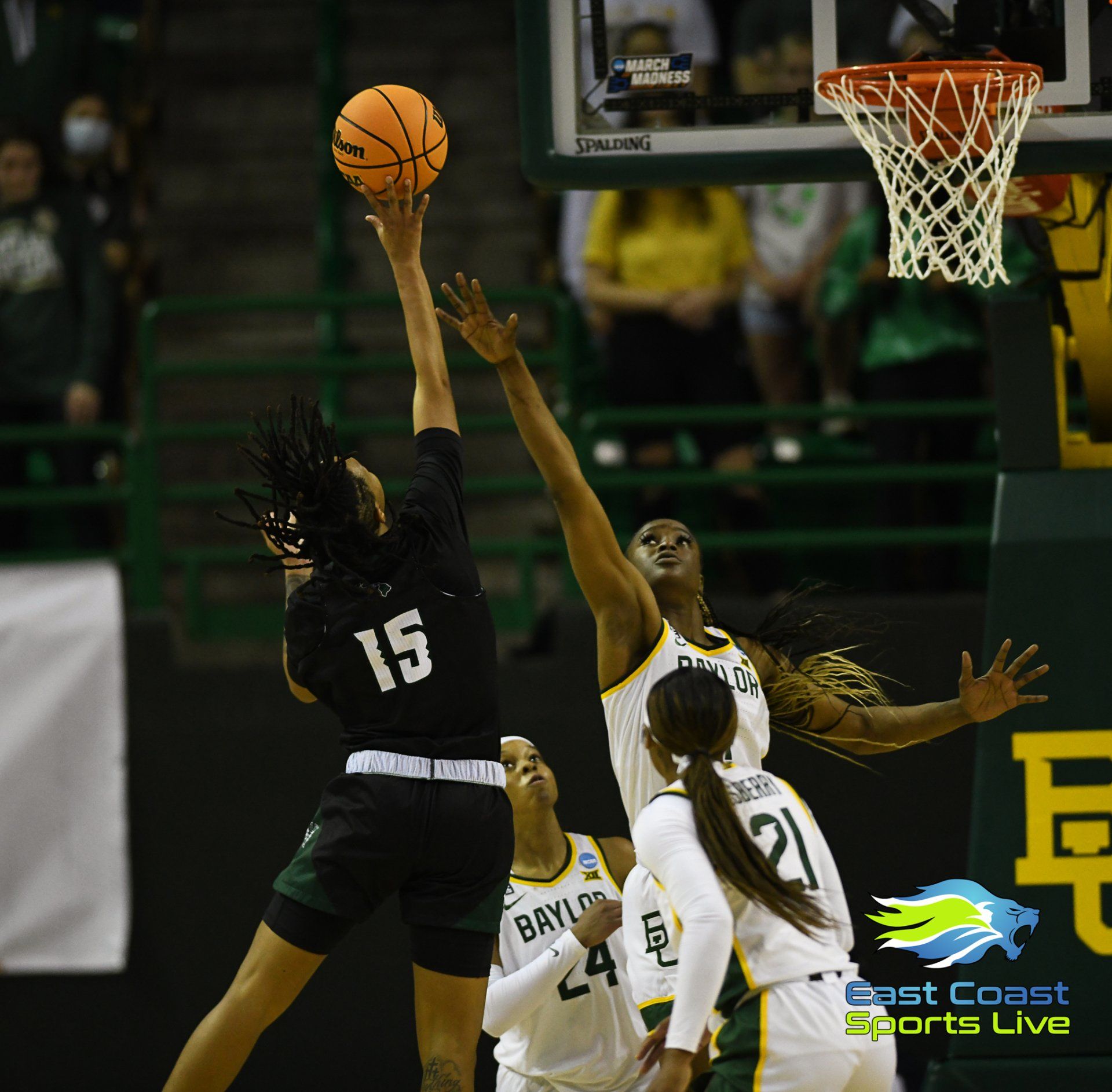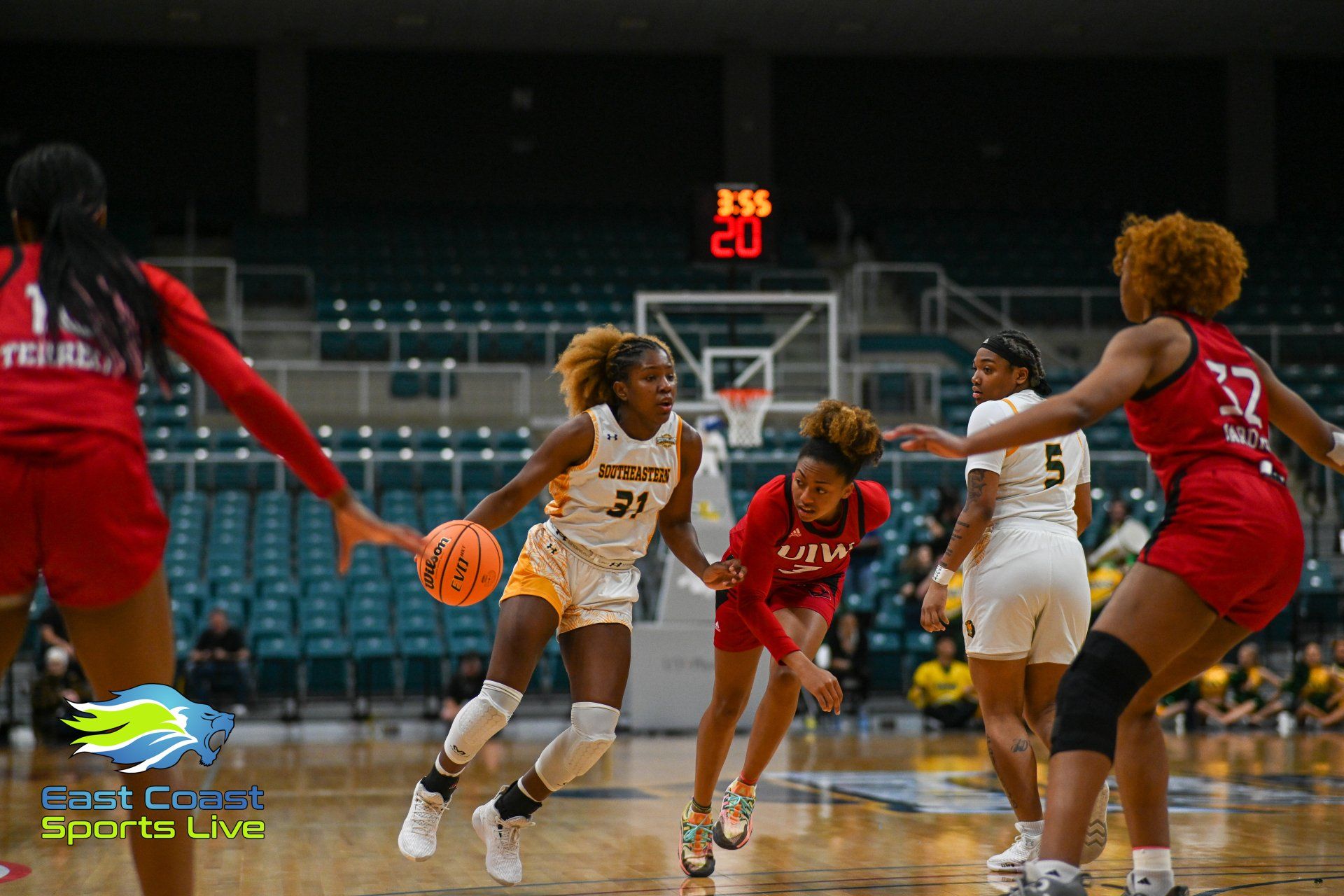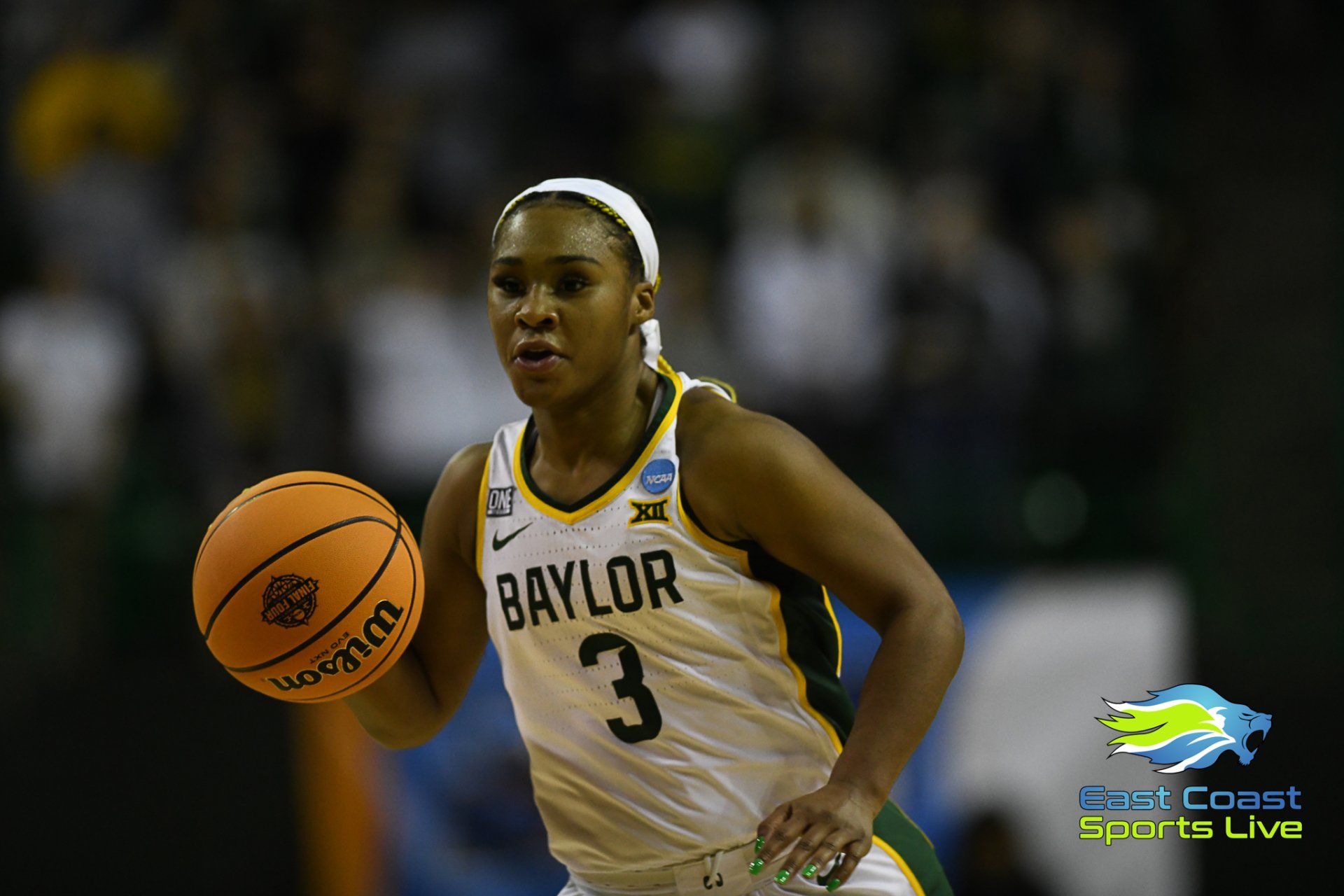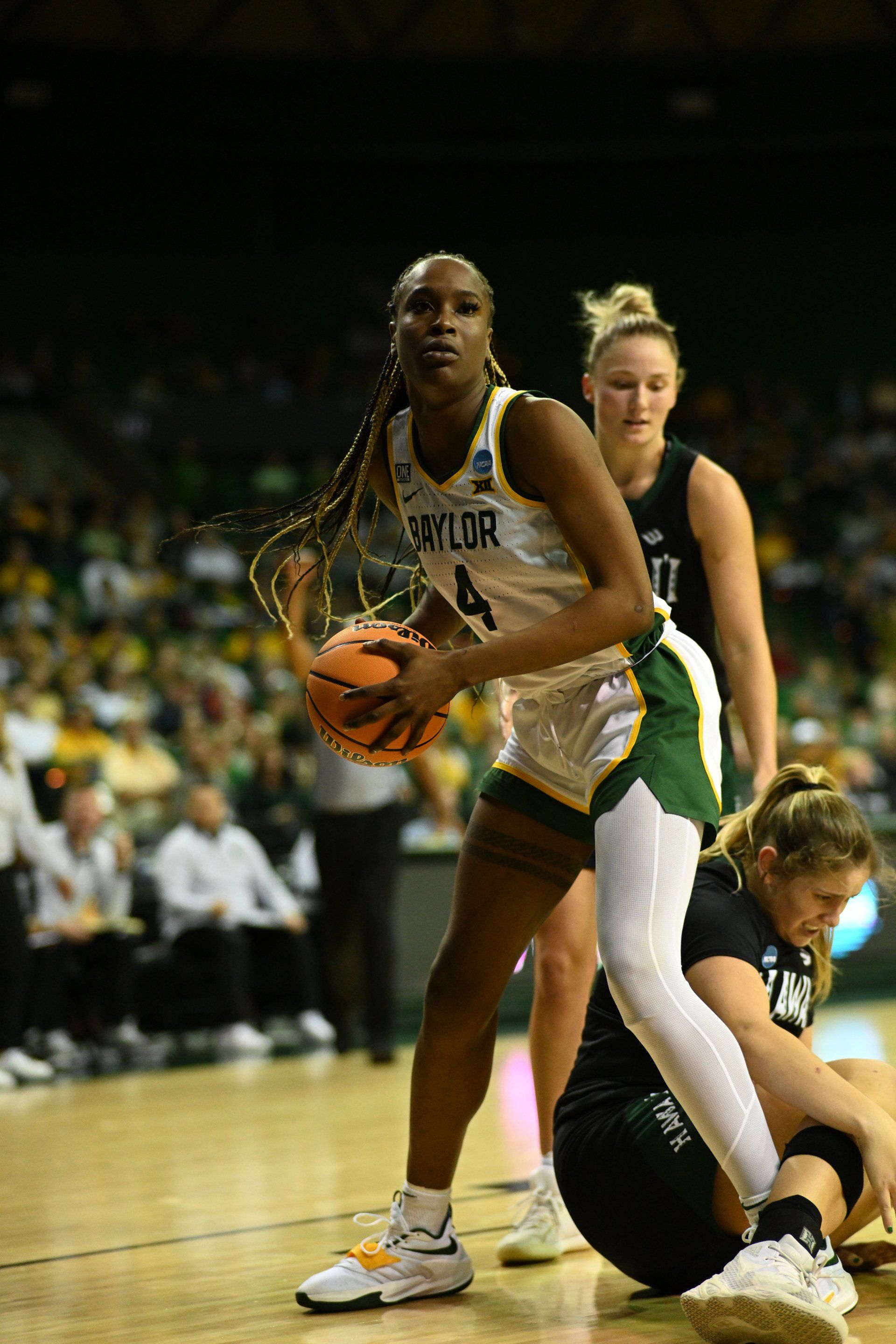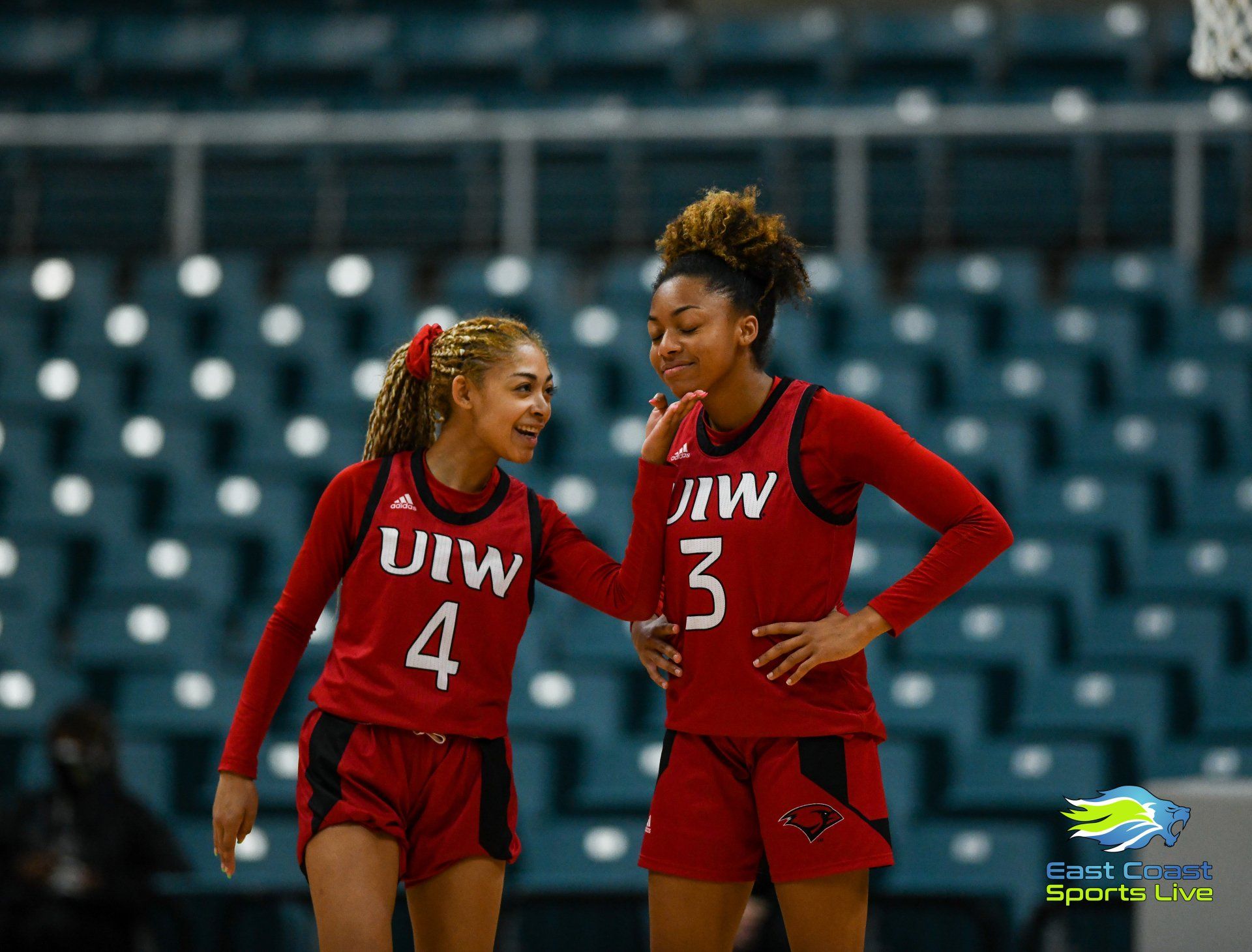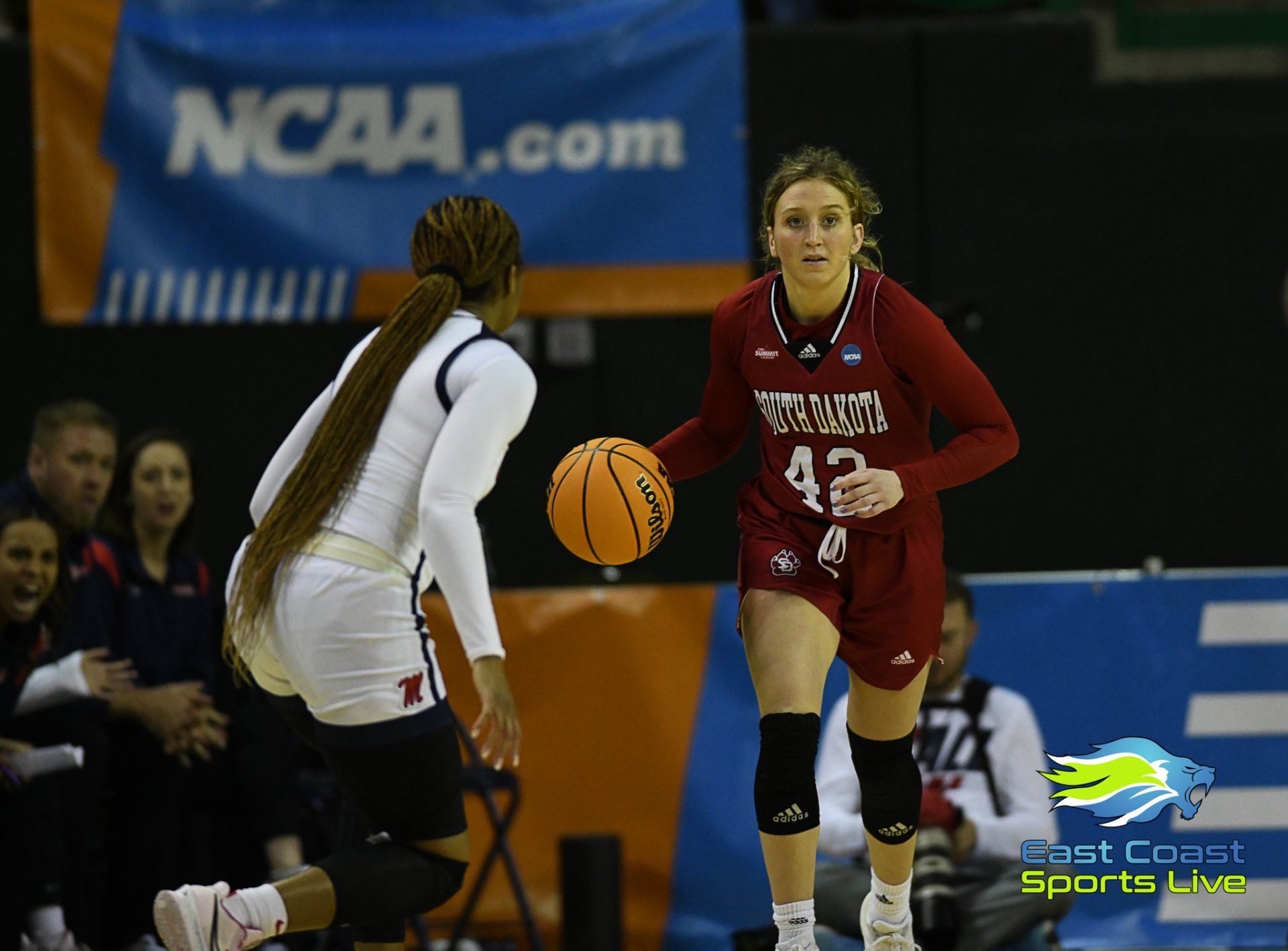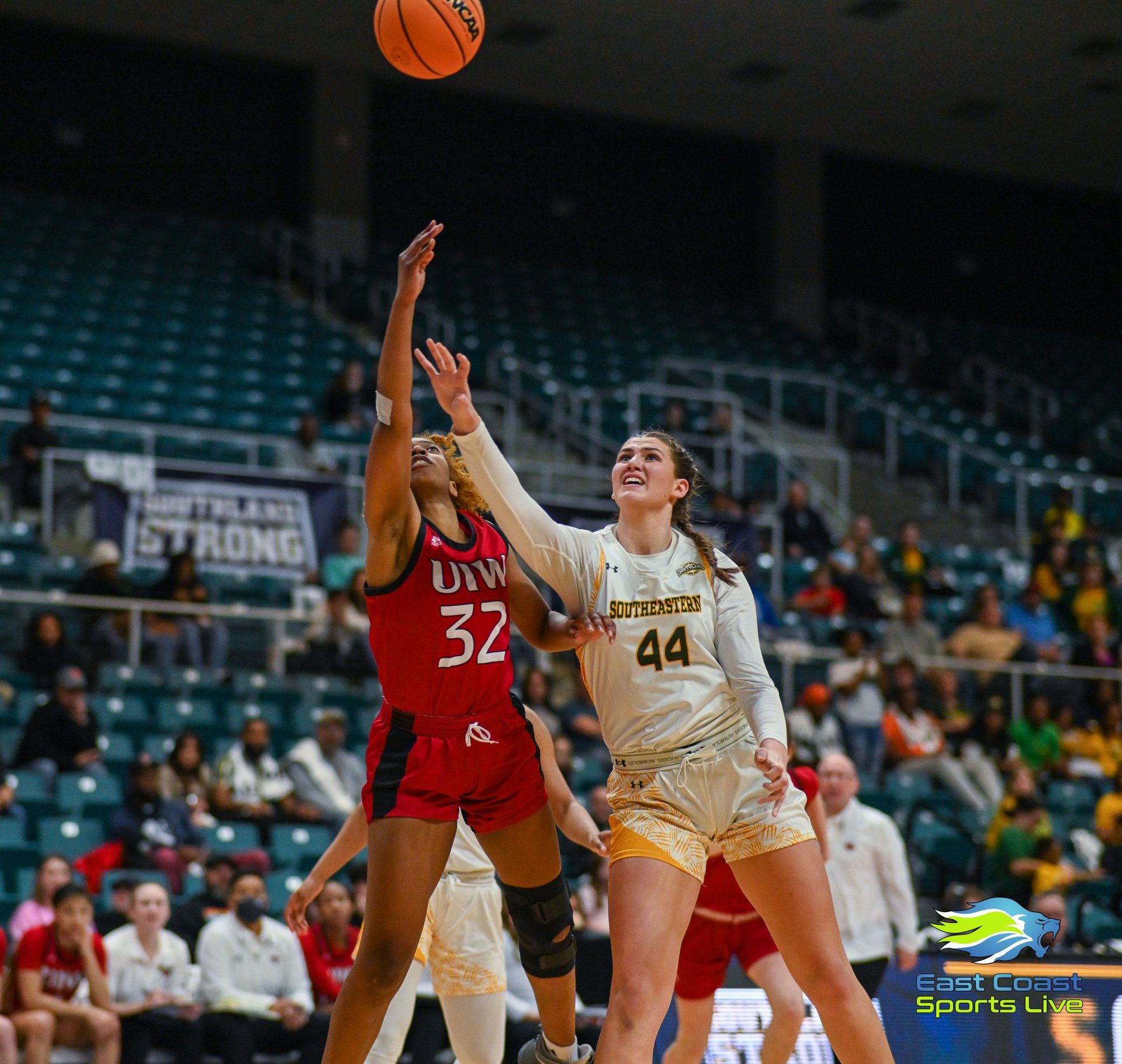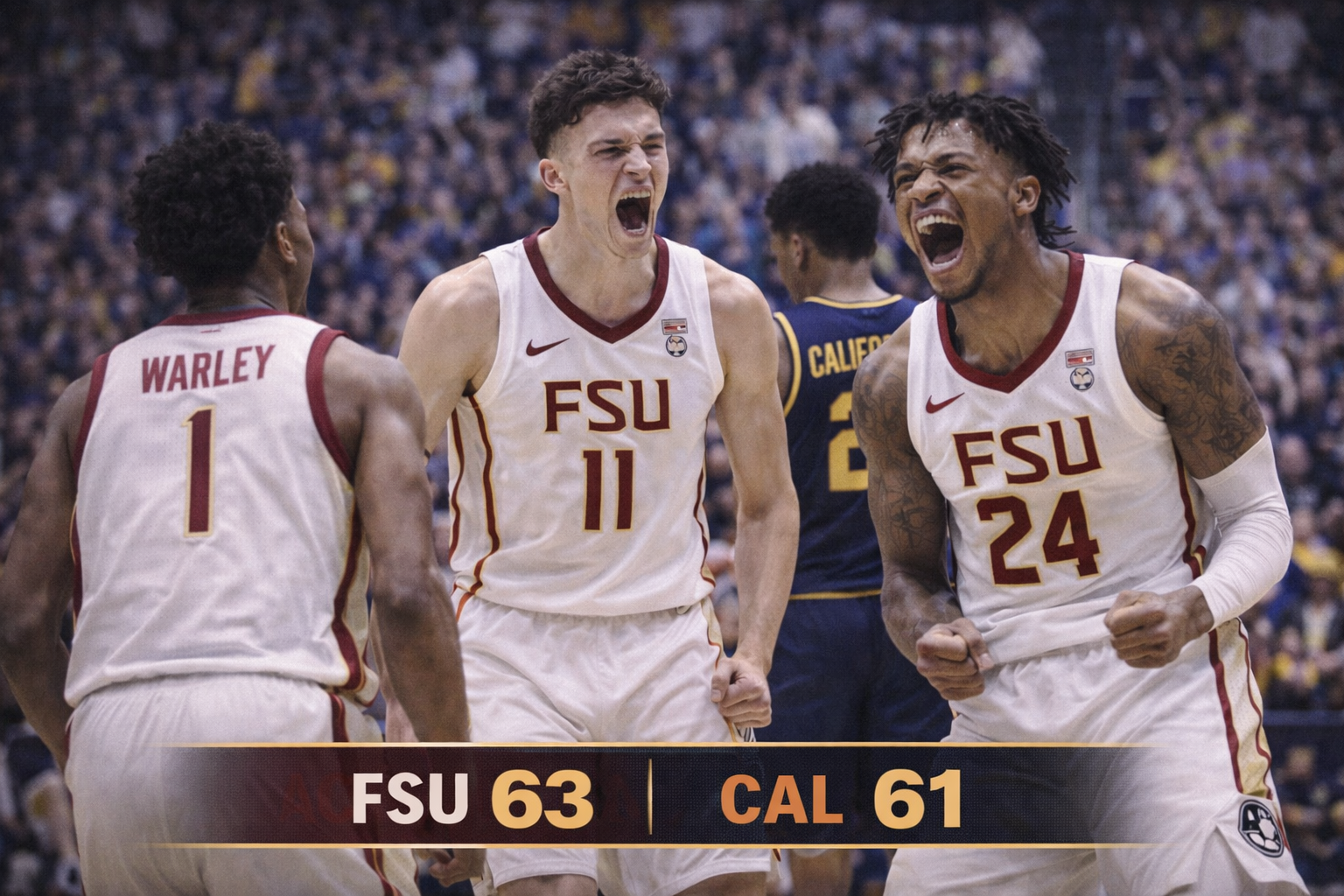East Coast Sports Live
Women's Basketball

The Valkyries delivered another statement win, defeating Phoenix 98-91 in a contest filled with pace, intensity, and momentum swings. From the opening tip, both teams showcased their offensive firepower, but it was the Valkyries’ ability to control the tempo late in the game that secured the hard-fought victory. Fast-Paced Opening The first quarter set the tone for what would become a high-scoring battle. The Valkyries, wearing their sharp black uniforms with purple trim, came out aggressive on both ends of the floor. Quick ball movement and decisive shot-making allowed them to build an early lead. Phoenix, in their crisp white jerseys accented with orange and violet, answered with perimeter shooting and strong finishes inside, keeping the game close. By the end of the opening frame, the score remained tight, with neither team able to pull away. Valkyries Push Ahead In the second quarter, the Valkyries began to establish control. Their transition game was on full display as they turned defensive stops into fast-break opportunities. Crisp passing and efficient shooting allowed them to stretch the lead into double digits midway through the period. Phoenix, however, refused to fold. A late scoring run sparked by aggressive drives to the rim cut into the deficit, leaving the Valkyries with only a narrow advantage at halftime. Phoenix Fights Back The third quarter was where Phoenix made their strongest push. Adjusting their defensive schemes, they slowed down the Valkyries’ rhythm and forced contested shots. Meanwhile, Phoenix found success with a balanced attack that blended outside shooting with second-chance opportunities off the glass. The scoreboard reflected the intensity as Phoenix clawed back, erasing the earlier gap and briefly taking the lead. Despite the pressure, the Valkyries showed resilience. Key defensive plays and a composed offensive stretch allowed them to regain momentum just before the end of the third, setting up a thrilling final quarter. Fourth-Quarter Surge The decisive moments came in the final 10 minutes. With the game hanging in the balance, the Valkyries leaned on their defensive presence and efficient shot selection. Timely steals led to fast-break baskets, while strong interior play prevented Phoenix from regaining control. The pace quickened, and the crowd roared as both teams traded baskets, but the Valkyries’ composure down the stretch made the difference. Phoenix continued to push, closing the gap to just a few points in the final minutes, but the Valkyries executed flawlessly on both ends of the floor. A late scoring burst and disciplined clock management helped them hold off Phoenix’s comeback bid, sealing the 98-91 win. Team Performances For the Valkyries, this victory was another display of their depth and versatility. Their offense excelled not only in transition but also in half-court sets, with multiple players stepping up to contribute at key moments. Defensively, their ability to force turnovers and protect the paint proved vital in holding Phoenix at bay. Phoenix, despite the loss, showcased resilience and determination. Their offensive balance and second-half adjustments nearly turned the game in their favor. The white-and-orange uniforms stood tall against the Valkyries’ relentless defense, and their ability to keep pace until the final buzzer highlighted their potential as a playoff threat. Implications Moving Forward The win pushes the Valkyries higher in the standings and further cements their reputation as one of the toughest teams to face this season. Their ability to remain poised under pressure and close out tight games continues to set them apart. For Phoenix, this narrow defeat will serve as motivation. While they fell just short, their performance revealed strengths that will be crucial moving forward. Their scoring depth and ability to adjust defensively in high-stakes moments will remain valuable assets as the season progresses. Closing Thoughts The matchup between the Valkyries and Phoenix delivered everything fans hoped for: energy, speed, and a thrilling conclusion. With both teams showcasing their strengths, it was the Valkyries’ fourth-quarter execution that ultimately decided the contest. The 98-91 victory not only extends their winning streak but also reinforces their status as a championship-caliber team.
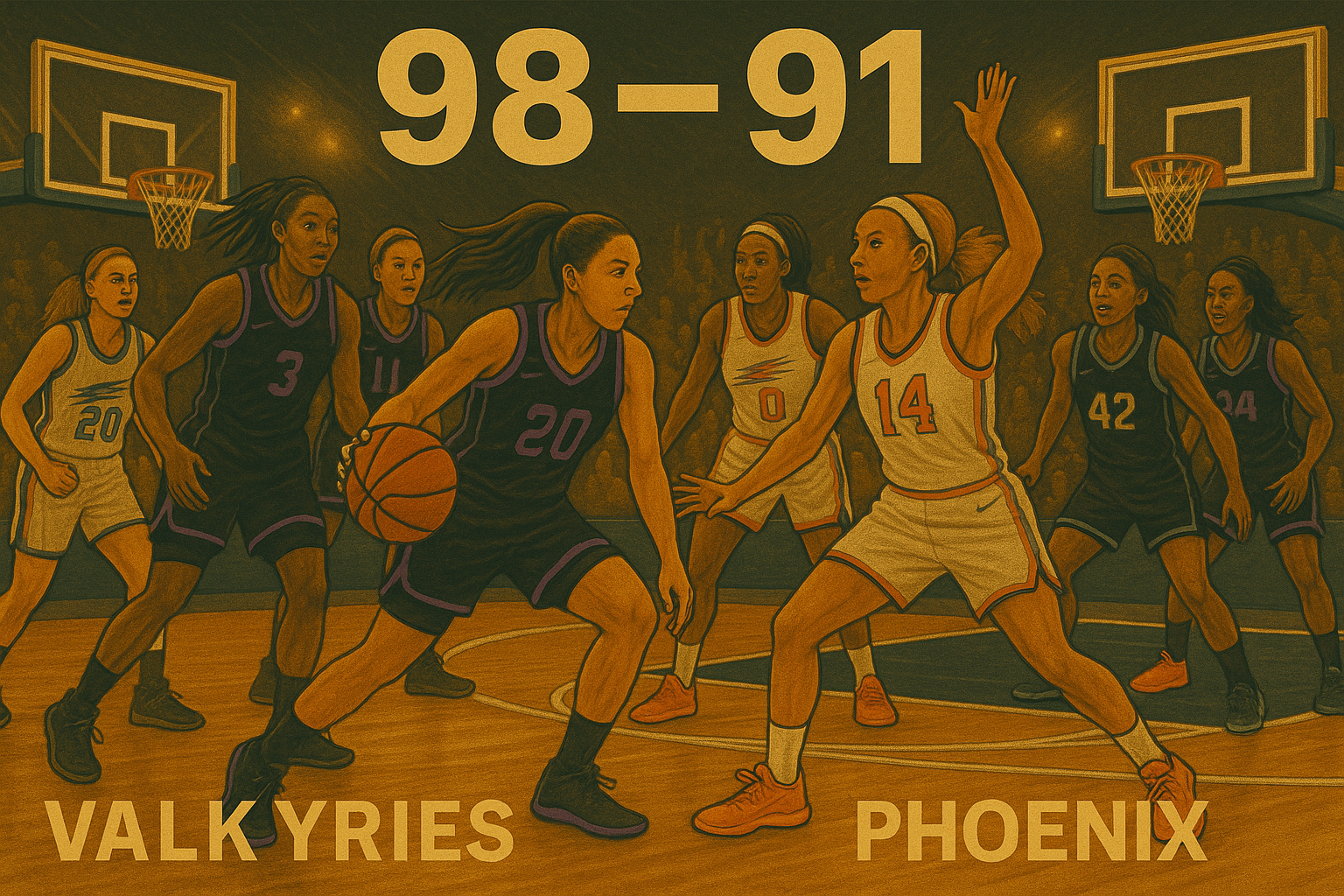
The Phoenix Mercury secured a hard-fought 98-91 road win over the Golden State Valkyries in a matchup that highlighted resilience, depth, and late-game execution. With the victory, Phoenix strengthened its postseason positioning while Golden State faced the challenge of competing with a shortened roster. Valkyries’ Limited Rotation Golden State entered the game with only eight available players after Tiffany Hayes and Cecilia Zandalasini were ruled out due to health concerns. Despite being shorthanded, the Valkyries made an early statement with strong energy and precise ball movement. Kate Martin stepped into the starting lineup and contributed with perimeter shooting, while Janelle Salaün provided an early scoring burst that fueled the offense. The limited rotation forced Golden State to rely heavily on its backcourt, with extended minutes required from key starters. The group responded admirably in the first half, building a double-digit advantage through consistent three-point shooting and disciplined execution. Burton’s Historic Performance One of the most notable aspects of the night was Veronica Burton’s career-best performance. She finished with 24 points and 14 assists without committing a turnover, marking the first time in league history a player recorded such a stat line. Her ability to control tempo, score efficiently, and distribute the ball kept Golden State competitive even as fatigue became a factor in the later stages. Burton’s precision from the free-throw line and composure in half-court sets allowed the Valkyries to maintain momentum for much of the first three quarters. Her play was a reminder of her growing importance to Golden State’s system, particularly when the roster is under strain. First Half Dominance The Valkyries put together one of their best offensive halves of the season, scoring 59 points before halftime. Their transition attack and accurate perimeter shooting gave them a 12-point cushion at one stage, thrilling the capacity crowd of more than 18,000 fans. Golden State’s ability to spread the floor created consistent scoring opportunities, and their ball security—just three turnovers for the entire game—was a major strength. The combination of offensive discipline and intensity in transition showcased the potential of the team when executing at a high level. Mercury’s Second-Half Surge Phoenix, however, adjusted effectively after halftime. Kahleah Copper spearheaded the comeback, finishing with 25 points while connecting on multiple three-pointers that swung momentum. Satou Sabally added 17 points, with the majority coming in the second half, including key baskets during the third-quarter rally. Alyssa Thomas provided balance in the interior, nearly achieving another triple-double with 13 points, nine rebounds, and eight assists. Her ability to rebound, initiate fast breaks, and keep possessions alive gave Phoenix the edge as the Valkyries began to tire. By the fourth quarter, the Mercury had completely shifted the tone of the contest. A decisive 20-8 scoring run highlighted their superior depth and composure under pressure. Ball movement created high-percentage looks, while defensive pressure limited Golden State’s perimeter rhythm. Key Contributions Beyond Copper’s leadership, Phoenix benefitted from balanced production across the roster. The ability of multiple players to step up in critical stretches underscored the team’s growth as a cohesive unit. In contrast, Golden State’s reliance on a shortened bench exposed vulnerabilities late in the game. Laeticia Amihere provided valuable minutes for the Valkyries, adding scoring and rebounding while bringing energy off the bench. Kate Martin’s timely three-pointers and Salaün’s first-quarter burst kept the team competitive, but sustaining offensive efficiency became difficult as the Mercury tightened their defensive schemes. Crowd and Atmosphere The game was played in front of a sellout crowd, continuing Golden State’s streak of home sellouts in its inaugural season. Fans remained engaged throughout, celebrating the Valkyries’ explosive first half and urging the team forward in the fourth quarter despite the late collapse. The atmosphere reinforced the rapid growth of support for the expansion franchise. Closing Stretch In the final minutes, Phoenix displayed superior execution. Half-court sets ran smoothly, defensive rebounding limited Golden State’s second chances, and Copper’s perimeter accuracy sealed the outcome. The Mercury’s composure contrasted with the Valkyries’ visible fatigue, which ultimately swung the result. The 98-91 victory reflected Phoenix’s ability to adapt midgame, manage momentum, and capitalize on depth advantages. For Golden State, the loss highlighted both resilience and the ongoing challenge of competing with a short rotation in a demanding schedule. Looking Ahead The win moved Phoenix to 21-13 on the season, keeping the team firmly positioned in the upper half of the standings with postseason seeding implications on the line. The Valkyries dropped to 18-17 but remained in the playoff picture, with upcoming opportunities to strengthen their position. Golden State will meet Phoenix again in their next outing, this time in Arizona, providing an immediate chance for redemption. For the Valkyries, the key focus will be recovery, roster stability, and maintaining the disciplined style of play that allowed them to thrive in the first half.
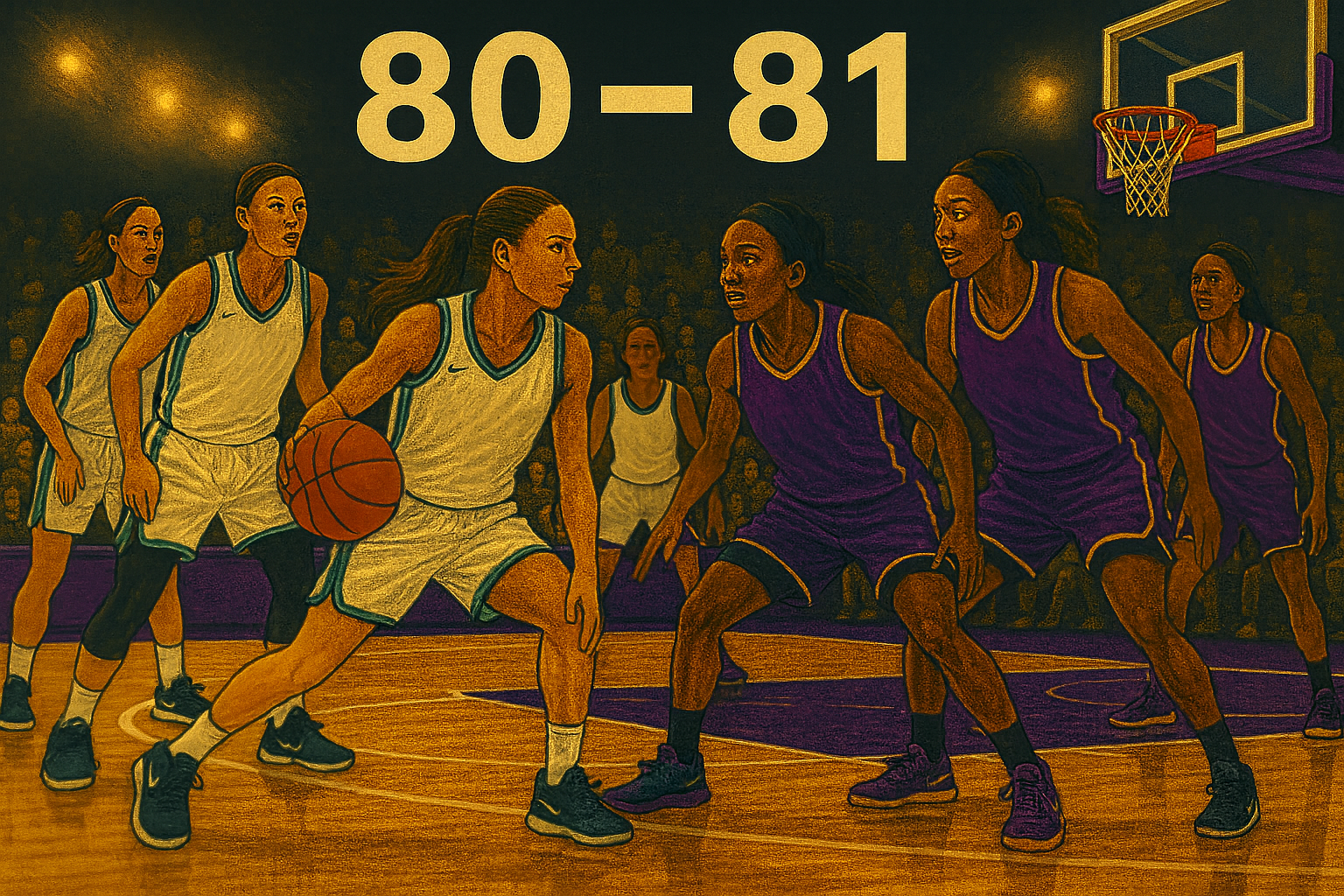
The Los Angeles Sparks and Dallas Wings delivered a contest that will be remembered long after the final buzzer. Despite an extraordinary performance from rookie sensation Paige Bueckers, who poured in a career-high 44 points, the Sparks claimed a nail-biting 81–80 victory on Wednesday night. Kelsey Plum delivered the dagger at the buzzer, a reminder that even when history is made, the scoreboard remains the ultimate judge. Paige Bueckers Joins Elite Rookie Company Few rookies have managed to command the WNBA spotlight as quickly as Bueckers. Against the Sparks, she not only set a new season-high for any player in the league but also matched Cynthia Cooper’s longstanding record for the most points by a rookie in a single game. Her fourth quarter was nothing short of breathtaking—she scored the Wings’ final 13 points , almost singlehandedly carrying Dallas back into contention. The 44-point explosion also pushed her past the 500-point, 100-assist milestone , making her the fastest rookie in Wings history to accomplish that feat. Although Dallas fell short in the standings, Bueckers’ performance underscored why she is already being discussed among the most electrifying young players in professional basketball. Sparks Find Late-Game Heroics While Bueckers stole much of the spotlight, the Sparks showed their veteran resilience. Kelsey Plum , who had struggled with efficiency for most of the night, drilled the game-winning jumper as the buzzer sounded. Her 20 points were vital, but the last two will be replayed on highlight reels for weeks. Rickea Jackson also played a starring role for Los Angeles. The sharpshooting forward caught fire from beyond the arc, knocking down a career-best six three-pointers en route to 25 points. Add in Cameron Brink’s gritty effort of 11 points and eight rebounds, and the Sparks had just enough balance to overcome Bueckers’ brilliance. Dallas Officially Eliminated from Playoff Contention The heartbreaking loss mathematically sealed Dallas’ fate, eliminating them from postseason contention. At 9–27 , the Wings endured a year filled with injuries and roster instability. Missing stars like Arike Ogunbowale, Ty Harris, and Li Yueru forced younger players into the spotlight. Yet, even in defeat, the organization found reasons to be optimistic. Bueckers is already emerging as a cornerstone, and Maddy Siegrist has been a revelation since returning from injury, averaging more than 16 points per game during her comeback stretch. Rookie guard JJ Quinerly has also shown poise, notching a career-high nine assists in the prior outing. While 2025 won’t end with playoff basketball for Dallas, the future looks brighter than their record suggests. Sparks Stay Alive in Playoff Race For the Sparks, the win carried weight beyond pride. Improving to 17–18 , Los Angeles tightened its grip on the postseason chase. With just a handful of games remaining, every victory is critical, and Plum’s clutch shot may serve as a turning point. The Sparks also continue to dominate the all-time series with the Wings, now leading 49–32. That historical edge, combined with their ability to deliver in crunch time, paints a picture of a franchise determined to claw back into title contention. What’s Next for Both Teams The Wings will use the remainder of the season to develop their young core and provide valuable minutes to rookies. With Bueckers already showing superstar potential and Siegrist returning to form, Dallas has the foundation of a competitive roster moving forward. Meanwhile, the Sparks remain focused on securing a postseason berth. With Jackson emerging as a reliable scoring option and Plum providing the veteran leadership needed in big moments, Los Angeles believes it can make noise in the playoffs. Final Thoughts Basketball games are often remembered for final scores, but some nights transcend the box score. Paige Bueckers’ 44-point masterpiece placed her in the history books, even as Dallas bowed out of the playoff race. For Los Angeles, it was a victory fueled by resilience, sharpshooting, and a buzzer-beating dagger. The Sparks head into the final stretch with momentum, while the Wings turn toward building for the future. On this night, however, both teams delivered a showcase of why the WNBA continues to captivate fans with drama, skill, and unforgettable moments.

Reese’s Impactful Comeback After missing seven games with a lingering back injury, Chicago Sky rookie sensation Angel Reese made her much-anticipated return to the court. The former LSU star immediately reminded fans of why she was the seventh overall pick in the 2024 WNBA Draft. Reese finished with 19 points on 9-of-13 shooting, pulled down seven rebounds, dished out four assists, and blocked a shot. Despite playing limited minutes as the team eases her back into the rotation, she looked sharp and aggressive on both ends of the floor. Her ability to attack the rim, create second-chance opportunities, and set up teammates sparked energy that had been missing from the Sky during her absence. Reese’s return was not just a personal milestone but a significant morale boost for a team that has struggled mightily in recent weeks. Fans inside Wintrust Arena roared with every basket she made, knowing she represents both the present and future of the franchise. Although the Sky ultimately fell 94-88 to the Seattle Storm, Reese’s performance was a reminder that Chicago has a cornerstone player capable of carrying the team through its rebuild. Sky’s Competitive Fight Despite Setbacks The Sky entered the matchup on one of the toughest stretches of the season, having lost 13 of their last 14 games. During that span, the average margin of defeat ballooned to more than 20 points, raising concerns about chemistry, coaching decisions, and long-term direction. Tuesday’s game against Seattle was a refreshing change of pace, as Chicago remained competitive until the final buzzer. Ariel Atkins contributed 19 points and five assists, keeping the offense steady while Reese found her rhythm. Kia Nurse and Kamilla Cardoso also reached double figures, providing much-needed balance in scoring. Chicago’s most impressive effort came in the fourth quarter, when they erupted for 38 points—outscoring the Storm and nearly erasing a 16-point deficit. The surge reflected a fight and resilience that had been absent in recent contests. Still, defensive lapses and missed opportunities at the free-throw line proved costly. The Sky had multiple chances to cut the lead to a single possession in the final minutes but couldn’t execute under pressure. For a young, rebuilding roster, the loss was yet another lesson in closing out games against elite competition. Seattle’s Veteran Leadership and Rising Star On the other side, the Seattle Storm leaned on both veteran stability and youthful promise to secure the win. Skylar Diggins-Smith led the way with 24 points and six assists, showing poise in late-game situations. Nneka Ogwumike was equally impactful, adding 21 points and key rebounds in the paint. Ogwumike also etched her name further into the record books by surpassing Sheryl Swoopes for fifth place on the WNBA’s all-time steals list, a testament to her two-way greatness. Perhaps the biggest storyline for Seattle was the continued rise of rookie Dominique Malonga. The 19-year-old phenom poured in 15 points, grabbed six rebounds, and blocked three shots. Her milestone of reaching 100 career field goals before turning 20 underscored her rapid development and bright future. For a team chasing playoff stability, her emergence adds another dimension to a roster already rich with talent. Seattle’s victory lifted their record to 18-18, keeping them firmly in the playoff hunt. For a squad that has dealt with inconsistency throughout the season, this game provided confidence and momentum heading into a grueling road trip. Coaching Decisions Under Scrutiny While Angel Reese’s return was the headline, many Sky fans left the arena questioning the coaching strategy. Notably, rookies Hailey Van Lith and Maddy Westbeld did not see any playing time, despite being among the few players signed beyond this season. With Chicago’s postseason hopes nearly extinguished, critics argue that development should take precedence over leaning on veterans with expiring contracts. Head coach Tyler Marsh’s decision to sideline two promising young talents raised eyebrows across the fanbase and media. The lack of developmental minutes contrasted sharply with the team’s rebuilding narrative, leaving many to wonder about the organization’s long-term vision. If Reese is to be the centerpiece of the Sky’s future, surrounding her with equally developed young talent should be a priority. Playoff Picture and Looking Ahead For the Sky, the loss dropped their record to 8-26, effectively eliminating them from playoff contention. Yet, Reese’s successful return offers fans a reason to stay engaged for the remainder of the season. Her growth, alongside emerging talents like Cardoso, will likely shape Chicago’s offseason strategy and roster moves. For the Storm, the win marked a crucial moment in solidifying their postseason push. At 18-18, they remain in a competitive cluster of teams fighting for seeding and momentum. Their blend of veteran leadership and youthful energy gives them a dangerous balance that could surprise opponents in the playoffs. Looking ahead, Chicago faces the New York Liberty in their next outing—a tall task against one of the league’s most dominant teams. Meanwhile, the Storm begin a challenging five-game road stretch that will test their endurance and consistency. For both franchises, this game may serve as a turning point: Seattle building momentum, and Chicago beginning to redefine its path forward with Reese leading the way.
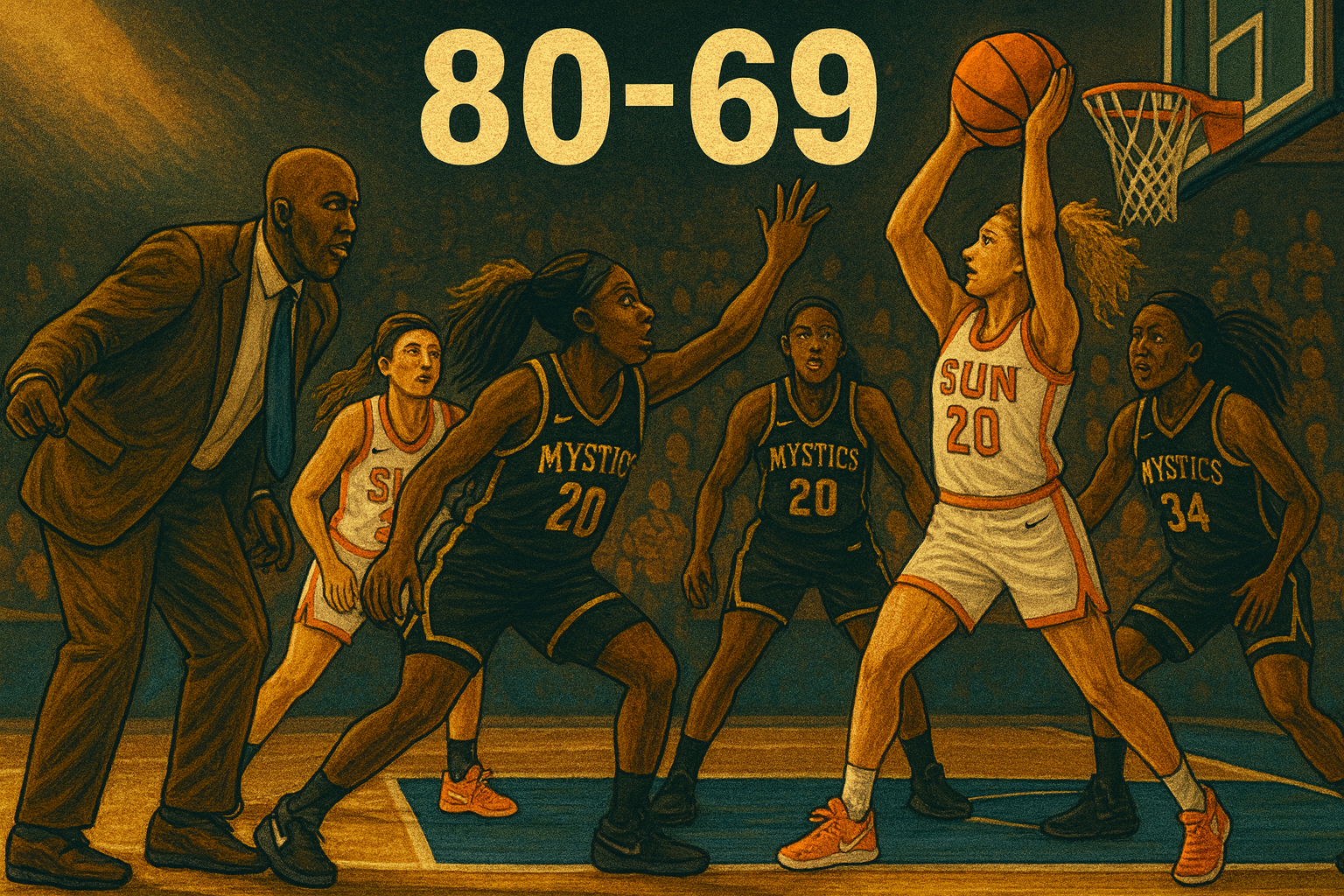
A Much-Needed Road Victory The Connecticut Sun finally broke through their road woes on Tuesday night, defeating the Washington Mystics 80–69 at CareFirst Arena. The win ended a grueling 13-game road losing streak, marking the Sun’s first victory away from home since May 30 against Indiana. For a team that has endured one of the league’s toughest seasons, this win was more than just a relief — it was a statement of perseverance. The Sun entered the game with only six victories, and their confidence had been tested after multiple close losses on the road. Against a Mystics team that had bested them earlier this season, the Sun played with urgency and determination. This victory was also significant because of the venue. The Sun had dropped five of their last six visits to Washington, including a demoralizing 104–67 loss earlier in the summer. Tuesday’s performance showed how far they had come since that defeat. Saniya Rivers Leads the Charge Saniya Rivers, the rookie guard who has quickly developed into one of Connecticut’s most reliable scorers, once again rose to the occasion. She poured in 17 points, grabbed four rebounds, and delivered several timely baskets that halted Washington’s momentum swings. Rivers has been the bright spot in an otherwise difficult season, and her growth was on full display. She scored seven of her points in the opening quarter, providing stability after the Sun fell behind 13–5 early. Later, her pull-up midrange jumpers helped Connecticut stave off a Mystics push in the third quarter. Veteran center Olivia Nelson-Ododa complemented Rivers with a near double-double: 15 points, nine rebounds, and four assists. Her dominance inside gave Connecticut the edge on the glass and in the paint, where they outscored Washington by a wide margin. Tina Charles, the experienced forward, chipped in 13 points and nine rebounds, providing leadership in crunch time. Bench Sparks Momentum The Sun’s bench made the biggest difference in the game, outscoring Washington’s reserves by an astounding 45–11 margin. This marked a season-high for Connecticut’s second unit, which has struggled at times to find consistency. Leila Lacan, the rookie guard, set the tone with her aggressive defense and quick playmaking. She contributed eight points, five assists, and four steals, repeatedly turning defensive stops into fast-break opportunities. Her impact extended beyond the stat sheet, energizing her teammates and frustrating Washington’s offense. By halftime, Connecticut had gone on a 9–0 run to push their lead to 47–35. They opened the second half with a 16-point advantage, and even when the Mystics trimmed the deficit, the Sun responded with steady contributions from their reserves. Mystics’ Milestones in Defeat The Mystics may have lost the game, but there were milestones to celebrate. Rookie Sonia Citron led all scorers with 19 points, showcasing her poise and ability to step up in big moments. Her third-quarter three-pointer etched her name into franchise history, as she surpassed Chamique Holdsclaw for the most points scored by a rookie in Washington’s history. With nine games left in the season, Citron has an opportunity to put the record well out of reach for future rookies. Shakira Austin also made history, reaching 1,000 career points with a layup in the second quarter. Austin, only in her third season, became the 24th player in Mystics history to reach that milestone. She finished the game with 12 points and seven rebounds, continuing her steady rise as one of Washington’s most dependable frontcourt players. Jade Melbourne added 11 points and four assists in her 100th career game, while Kiki Iriafen pulled down 12 rebounds — her fifth consecutive game with double-digit boards, setting a new franchise record for rookies. Team Effort Despite the Loss Washington showed flashes of brilliance, particularly in the first quarter when they jumped out to a quick lead. Their ball movement remained sharp, finishing with 21 assists as a team. Sug Sutton’s seven assists tied her season high, while the Mystics held Connecticut to just three made three-pointers, tying their opponent’s season-low from beyond the arc. Still, the lack of bench production and missed opportunities around the rim ultimately doomed the Mystics. Despite their strong perimeter defense and rebounding effort, they could not overcome Connecticut’s balanced attack. The Atmosphere and Momentum Shift The crowd at CareFirst Arena was vocal from the tip, especially after Washington’s hot start. However, the Sun’s 9–0 run to close the half shifted momentum dramatically. The once-electric arena fell quieter as Connecticut executed their offense with precision. Every time the Mystics appeared ready to mount a comeback, the Sun’s veterans or bench players responded. From Rivers’ jumpers to Nelson-Ododa’s finishes inside, Connecticut showed poise they had been missing on the road for months. Looking Ahead For the Sun, this victory represents resilience and hope. Ending a 13-game road skid not only boosted morale but also reminded the team that they can compete against playoff-caliber opponents. As they look ahead to their rematch with the Mystics at Mohegan Sun Arena, the challenge will be consistency. The Mystics, despite the loss, remain focused on development and playoff preparation. With Sonia Citron blossoming into a star and Shakira Austin establishing herself as a cornerstone, Washington has a promising future. Their rematch with Connecticut will be another chance to tighten execution and improve their playoff positioning. For both teams, Tuesday’s clash was more than just a mid-season battle — it was a glimpse into their evolving identities. The Sun proved they could win on the road, while the Mystics highlighted the young talent that could define their next era.
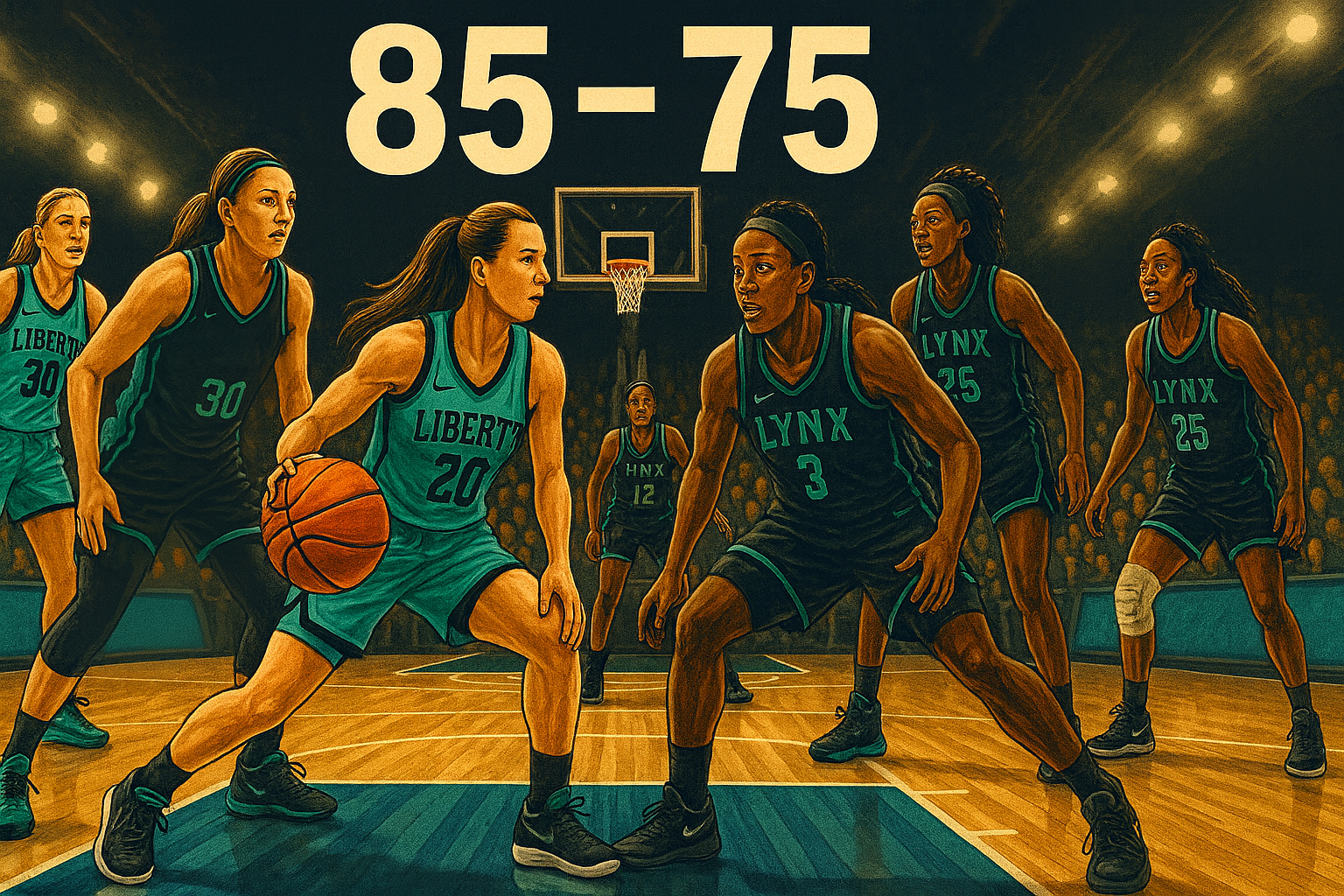
A Strong Start Sets the Tone The New York Liberty displayed poise and control in their 85–75 win over the Minnesota Lynx, securing another key victory as the season moves deeper into the playoff stretch. Both teams entered the matchup looking to strengthen their positions, but it was the Liberty’s balance on offense and timely defense that made the difference. From the opening tip, the Liberty used their size and speed to establish momentum, pushing the pace and forcing Minnesota into difficult shot selections. The first quarter saw the Liberty apply early pressure, scoring consistently in transition while moving the ball effectively in half-court sets. Minnesota responded with resilience, using sharp perimeter shooting to keep the game close. Still, the Liberty ended the quarter with a slim lead, setting the stage for an evenly contested battle. Liberty Pull Away in the Second Quarter In the second period, New York’s defense began to tighten. Quick rotations on the perimeter and an improved effort on the boards limited Minnesota’s second-chance points. Offensively, the Liberty leaned on efficient ball movement, finding open looks both inside the paint and beyond the arc. Their ability to convert high-percentage shots created separation, and by halftime they had built a two-possession lead. Minnesota fought to stay within striking distance, but turnovers in key moments slowed their rhythm. The Liberty’s balanced scoring ensured that no single defender could lock down their attack, with multiple players stepping up to share the scoring load. This versatility proved crucial as the Lynx struggled to keep pace. Lynx Surge in the Third Quarter The third quarter gave Minnesota a lifeline. The Lynx came out with renewed energy, hitting mid-range jumpers and drawing fouls that allowed them to close the gap. Their defensive intensity also increased, with more pressure applied to New York’s guards. For a brief stretch, it appeared momentum was shifting toward Minnesota as they cut the deficit to just three points. However, the Liberty remained composed under pressure. With disciplined execution, they slowed the tempo and worked for efficient possessions. A timely three-pointer late in the quarter, followed by a defensive stop, allowed New York to maintain control heading into the final frame. Closing Strong in the Fourth In the last quarter, New York displayed the depth and composure that has become a hallmark of their success this season. While Minnesota continued to fight, the Liberty’s combination of perimeter shooting and interior dominance proved too much. Clutch baskets in the final minutes extended the lead to double digits, effectively sealing the win. The Lynx pushed until the final buzzer, but their offensive efficiency faltered down the stretch. Missed opportunities in transition and late-game turnovers limited their chances of mounting a comeback. The Liberty, in contrast, showed veteran discipline, converting free throws and closing out the game with authority. Key Performances For the Liberty, the scoring was well-distributed, with multiple players reaching double figures. Their ability to share the ball and create balanced offense highlighted why they remain one of the most dangerous teams in the league. Defensive contributions also stood out, as New York effectively neutralized Minnesota’s top threats during key stretches of the game. Minnesota had standout performances as well, particularly in the third-quarter rally. Their perimeter shooters kept the team competitive, and strong individual efforts inside prevented the Liberty from dominating the paint entirely. However, inconsistency across four quarters ultimately kept them from overtaking their opponent. What This Means Moving Forward This victory adds momentum for the Liberty as they continue to build toward the postseason. Their ability to maintain composure under pressure and close games effectively reflects the growth of a team ready to contend at the highest level. For the Lynx, the loss serves as a reminder of the need for consistency, particularly in late-game execution. Still, their fight and resilience prove that they remain a dangerous team capable of challenging top-tier opponents. Final Take The Liberty’s 85–75 win over the Lynx was a showcase of balance, poise, and execution. Minnesota showed flashes of brilliance, but New York’s depth and discipline ultimately prevailed. With the season intensifying, both teams will look to sharpen their performances, but for now, the Liberty leave the court with another hard-earned win that strengthens their playoff outlook.
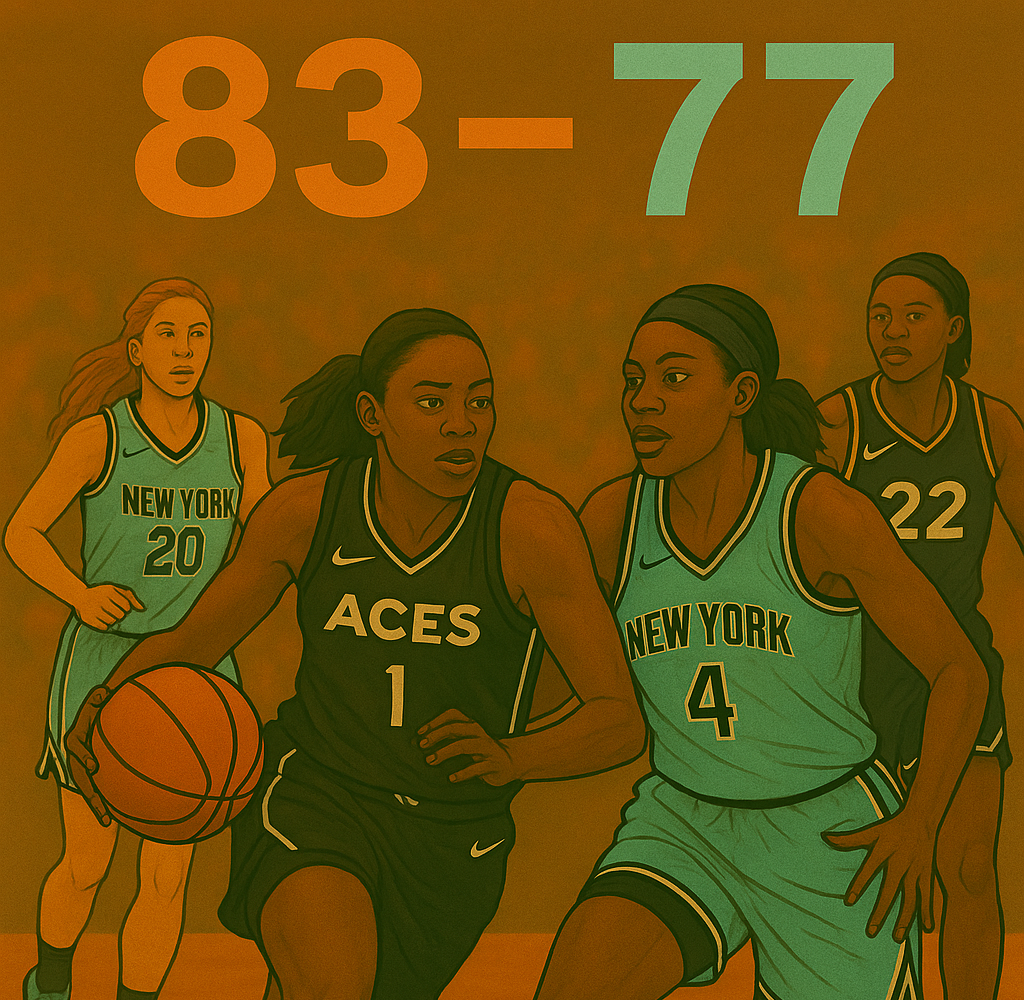
A Needed Breakthrough Against a Rival The Las Vegas Aces finally found success against one of their toughest rivals, defeating the New York Liberty 83-77 at Michelob ULTRA Arena on Wednesday night. The win was particularly significant as it snapped a long regular-season losing streak to New York, giving the Aces their first such victory since 2023. The contest was as competitive as expected between two championship-caliber teams. With thirteen lead changes, nine ties, and neither side ever leading by more than seven points, momentum swung back and forth for much of the night. But in the final minutes, Las Vegas executed more effectively on both ends of the floor to secure its fifth straight win and strengthen its playoff positioning. Loyd Sparks Offense Off the Bench Jewell Loyd delivered one of the night’s most decisive performances. Coming off the bench, she scored 21 points while hitting five shots from beyond the arc. This marked the 26th time in her career she has reached at least five three-pointers in a game, placing her among the league’s most prolific perimeter shooters. Loyd’s timely shooting was most impactful late in the third quarter. After the Liberty built a seven-point lead, the Aces stormed back with consecutive long-range makes. Jackie Young added a crucial four-point play to put Las Vegas in front 59-58. That sequence gave the Aces their first lead since early in the first half and energized the home crowd. Wilson Dominates the Paint A’ja Wilson continued her run of dominance, finishing with 17 points and 16 rebounds for her 15th double-double of the season. She controlled the paint on both ends of the court, anchoring the defense while drawing fouls and converting free throws down the stretch. Wilson’s efficiency at the foul line proved vital. She made all 11 of her attempts, marking the eighth time in her career she has been perfect from the line with at least ten attempts. That consistency under pressure helped seal the victory in the closing minutes. Balanced Contributions From Aces’ Core Beyond Loyd and Wilson, Las Vegas leaned on its core group of playmakers. Jackie Young tallied 15 points, including a buzzer-beater to close the third quarter, while Chelsea Gray contributed 13 points and orchestrated the offense with poise. The Aces also showcased their depth. Even without Cheyenne Parker-Tyus, who missed the game on maternity leave, the rotation provided enough energy and defensive stops to outlast New York in crunch time. Liberty Struggle in Closing Minutes For New York, the defeat underscored lingering struggles in tight finishes. Emma Meesseman led the Liberty with 24 points and 10 rebounds, producing her second consecutive 20-plus-point outing. Sabrina Ionescu added 18 points and Jonquel Jones chipped in 11, but the Liberty offense stalled when it mattered most. In the fourth quarter, New York missed eight straight shots during a critical stretch. While Meesseman and Ionescu combined for all of the team’s 14 points in the period, the lack of balance hurt their chances of reclaiming the lead. New York also played shorthanded once again. Breanna Stewart remained sidelined with a knee injury, and Isabelle Harrison and Nyara Sabally were also unavailable. Though Kennedy Burke returned from a calf injury to add eight points in limited minutes, the Liberty lacked the depth to counter Las Vegas’ second-half push. Key Numbers Tell the Story The Aces relied heavily on their ability to generate second opportunities and convert at the line. They outrebounded the Liberty 39-30 and grabbed 17 points off 11 New York turnovers. Most importantly, they went 23 of 28 at the free-throw line, while the Liberty attempted just 16 free throws. Despite shooting only 38.5 percent from the field overall, Las Vegas overcame its inefficiency by hitting timely three-pointers and dominating the possession battle. New York, by comparison, shot 43.8 percent but faltered late, managing just 4 of 16 from the field in the decisive fourth quarter. Looking Ahead With the win, Las Vegas improved to 19-14, keeping pace in a crowded playoff race. The victory also extended their home sellout streak to 42 consecutive games, the longest in league history. The Liberty, now 21-12, continue their road trip with a crucial matchup against Minnesota. Having lost two of their last three contests against top-tier competition, New York will need to regroup quickly to maintain its spot near the top of the standings. For the Aces, the momentum from five straight wins and a breakthrough against New York could be the turning point in their season. Their ability to combine star power with bench scoring makes them a formidable opponent as the postseason approaches.
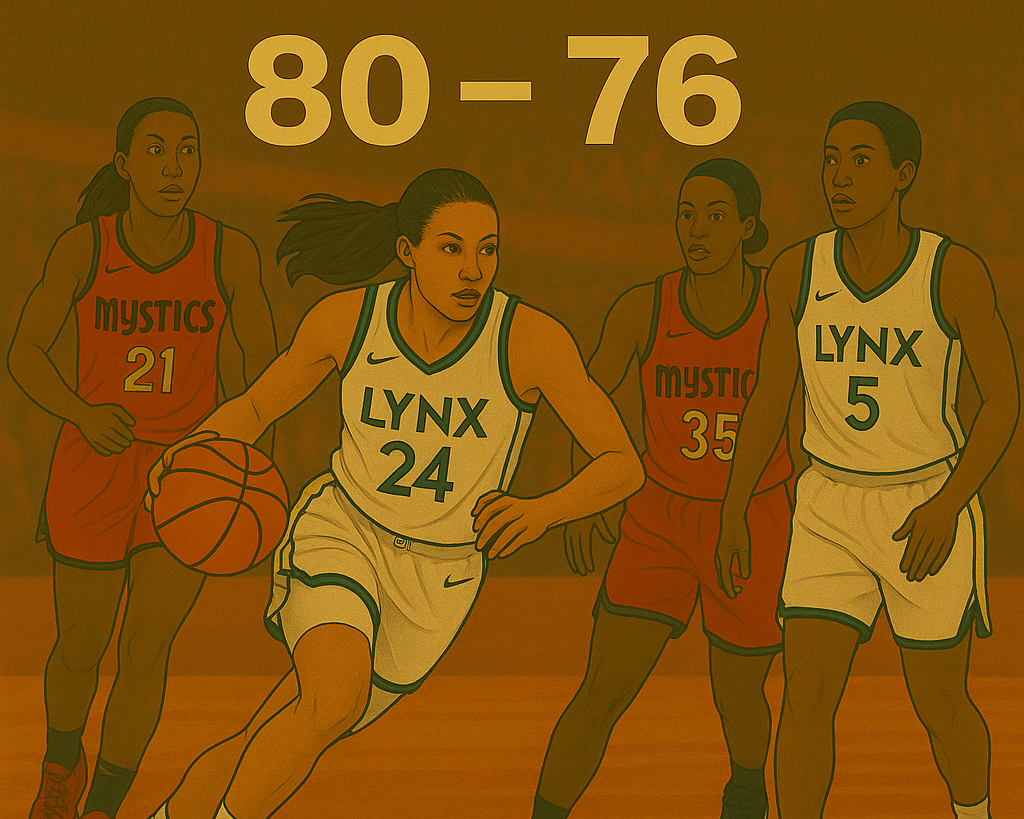
Lynx Extend Winning Streak The Minnesota Lynx secured a crucial road win on Tuesday night, defeating the Washington Mystics 80–76 in a game defined by tight defense, rebounding battles, and clutch scoring. The victory extended Minnesota’s winning streak to three games, moving them further up the Western Conference standings as the playoff picture tightens. Minnesota relied on a balanced offensive attack and aggressive play in the paint to overcome Washington’s strong start. Kayla McBride led the charge with a team-high 21 points, while Napheesa Collier contributed 18 points, eight rebounds, and three steals. The Lynx also benefited from strong bench production, which proved decisive in the closing minutes. Mystics Open Strong Washington began the game with energy, using quick ball movement and perimeter shooting to jump out to an early lead. Ariel Atkins scored eight first-quarter points, while Shakira Austin controlled the paint on both ends, pulling down key rebounds and altering shots. The Mystics’ defense forced the Lynx into several early turnovers, and their transition offense translated those mistakes into points. By the end of the first quarter, Washington held a narrow lead, but Minnesota’s defense began to tighten. The Lynx closed the gap in the second quarter, attacking the rim more aggressively and drawing fouls to slow the Mystics’ momentum. Minnesota Gains Control in the Second Half The third quarter proved pivotal for the Lynx, as they turned a slim halftime deficit into a five-point lead heading into the fourth. Collier’s all-around play fueled the surge, while McBride and Bridget Carleton hit timely shots from beyond the arc to stretch Washington’s defense. Defensively, Minnesota limited the Mystics to just 16 points in the third quarter. They forced difficult mid-range attempts and shut down Washington’s pick-and-roll offense, making it harder for Atkins and Natasha Cloud to create clean looks. Clutch Moments Seal the Win The final period featured multiple lead changes as both teams traded baskets and defensive stops. Washington pulled within one point with under two minutes remaining, but the Lynx responded with back-to-back scores from Carleton and McBride. Minnesota’s free-throw shooting proved critical down the stretch, as they converted six attempts in the final minute to maintain control. The Lynx closed the game on a 7–2 run, stifling Washington’s last possessions with disciplined defense. Key Performers McBride’s scoring efficiency stood out, as she shot over 50% from the field and provided steady offense in critical moments. Collier once again displayed her versatility, impacting the game with her scoring, rebounding, and defensive presence. For Washington, Atkins led all scorers with 23 points, while Austin posted a double-double with 14 points and 11 rebounds. Cloud contributed 12 points and six assists, but the Mystics’ overall shooting dipped in the second half, particularly from long range. Bench Contributions Make the Difference One of the deciding factors in the game was Minnesota’s bench production. Carleton’s 10 points and key three-pointer in the fourth quarter provided a spark, while Dorka Juhász added six rebounds and solid defensive work against Washington’s frontcourt. By contrast, the Mystics’ bench was limited to single-digit scoring, which put added pressure on their starters to generate offense throughout the contest. Defensive Discipline While neither team shot exceptionally well from deep, Minnesota’s ability to contest shots without fouling played a big role in the win. The Lynx limited the Mystics to just 12 free-throw attempts, compared to their own 21, which helped offset Washington’s early hot shooting. The Lynx also dominated the turnover battle, forcing 14 Mystics miscues while committing just nine themselves. Those extra possessions proved vital in a game where both teams had stretches of cold shooting. Playoff Implications The win moves Minnesota closer to securing a top playoff seed, as they continue to find ways to close out tight games on the road. The Lynx’s ability to balance inside scoring with perimeter threats gives them flexibility heading into the final weeks of the regular season. For Washington, the loss was a setback in their push for a higher playoff position. While the Mystics remain competitive, they will need to improve their late-game execution and bench scoring to avoid falling behind in the standings. Looking Ahead The Lynx return home for their next matchup, where they will aim to continue their winning streak and solidify their place among the conference’s top contenders. Collier’s leadership and McBride’s scoring touch remain central to their success, while the bench’s continued contributions will be essential against stronger opponents. The Mystics will look to regroup quickly, focusing on maintaining their first-half energy for the full 40 minutes. Their ability to get consistent production beyond Atkins and Austin will be critical as they fight to maintain their playoff positioning. With both teams eyeing the postseason, Tuesday night’s close, physical contest was a preview of the intensity and precision required to advance deep into the playoffs.
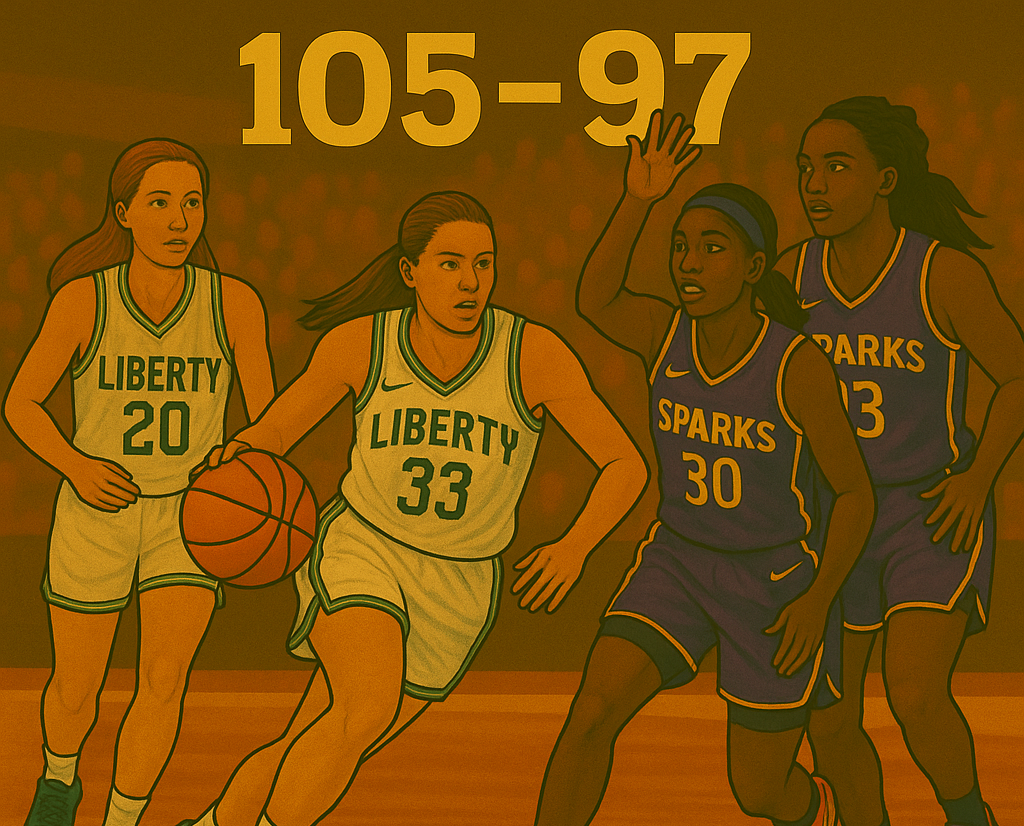
Liberty Hit Season-High in Points The New York Liberty showcased their offensive firepower on Tuesday night, defeating the Los Angeles Sparks 105-97 at Crypto.com Arena. The victory marked the Liberty’s highest point total of the season and tied head coach Sandy Brondello with Richie Adubato for the most wins in franchise history at 100. Emma Meesseman, stepping into a larger role with Breanna Stewart sidelined due to a knee injury, led the way with a season-high 24 points and nine rebounds. Jonquel Jones added a double-double with 21 points and 11 boards, while Leonie Fiebich contributed 20 points on efficient shooting. The balanced scoring effort allowed New York to maintain control late, despite Los Angeles’ interior dominance. Sparks Battle in the Paint The Sparks put up an impressive offensive showing of their own, shooting 46.8% from the field and scoring 52 points in the paint — their highest total in regulation this season. Kelsey Plum led all scorers with 26 points, adding five assists and five rebounds, and tying Nneka Ogwumike’s franchise record for most 20-point games in a single season with 19. Dearica Hamby delivered another strong performance with 21 points, eight rebounds, and four steals. Her eight boards also moved her into 26th place on the WNBA’s all-time rebounding list. Azurá Stevens chipped in 17 points, four assists, and three steals while passing Lisa Leslie for sole possession of 10th in franchise history for three-pointers made. Despite those efforts, Los Angeles couldn’t contain New York’s perimeter shooting. The Liberty connected on 14 three-pointers — the most allowed by the Sparks this season — and shot 50% from beyond the arc overall. Game Flow and Key Moments The matchup was tight through much of the night, with neither team able to build a comfortable lead until the closing minutes. Natasha Cloud’s back-to-back layups in the fourth quarter pushed New York’s advantage to 96-85, tying their largest lead of the game. Sabrina Ionescu added a timely layup shortly afterward, and Cloud struck again in the lane to extend the gap to 102-91 with just over a minute left. Los Angeles had opportunities to close the gap but was slowed by the Liberty’s defensive adjustments and zone coverage. New York’s ability to stretch the floor with multiple scoring threats made it difficult for the Sparks to mount a late comeback. Brink’s Early Exit The Sparks suffered a setback late in the first half when sophomore forward Cameron Brink exited with an ankle injury. Brink, who recently returned from a long-term knee injury, did not play in the second half. Head coach Lynne Roberts confirmed that the decision to keep her out was partly due to her ongoing minutes restriction. Without Brink’s defensive presence, Hamby and Stevens anchored the paint, combining for 38 points and 12 rebounds. However, New York capitalized on the absence by attacking inside and continuing their hot shooting from deep. Defensive Challenges for L.A. While the Sparks’ offense performed at a high level, their defense struggled to contain the Liberty’s rhythm. New York shot 55.9% from the field and controlled the pace for much of the second half. The Sparks did win the battle in second-chance points (14-7) and dominated on the fast break (15-0), but those advantages weren’t enough to offset the Liberty’s scoring efficiency. Roberts acknowledged after the game that her team’s defensive energy was not at its peak. Los Angeles had played five games in eight days, a stretch that tested their stamina and focus. Still, the Sparks have been one of the league’s hottest teams since the All-Star break, and they remain in the thick of the playoff race. Liberty’s Depth on Display The win was a testament to New York’s depth, as they overcame the absence of multiple key players, including Stewart, Isabelle Harrison, and Nyara Sabally. Alongside Meesseman, Jones, and Fiebich, Ionescu chipped in 14 points and six assists, and Cloud contributed 11 points with clutch baskets down the stretch. The Liberty’s victory kept them near the top of the Eastern Conference standings and provided a momentum boost after a loss to Minnesota in their previous outing. Looking Ahead The Sparks will aim to regroup quickly as they prepare for another important matchup in their playoff push. Maintaining their offensive efficiency while shoring up defensive lapses will be key as they enter the final stretch of the season. For the Liberty, the performance reinforced their status as a championship contender. With Stewart expected to return before the postseason and role players stepping up in her absence, New York’s versatility and balance remain among the league’s best assets. The 105-97 scoreline reflected not just the Liberty’s ability to light up the scoreboard, but also the Sparks’ resilience in a high-paced, high-stakes game — the kind of intensity both teams will need to replicate in the weeks ahead.


